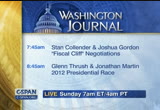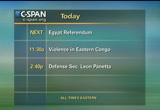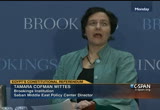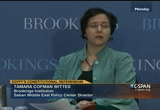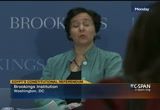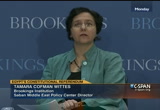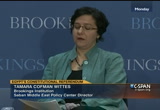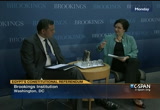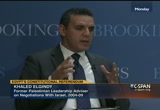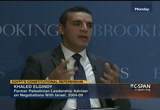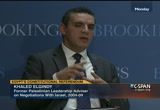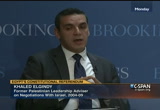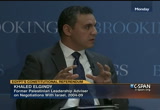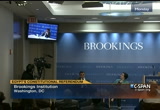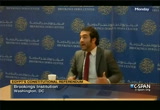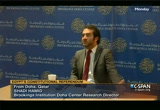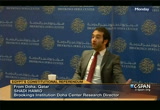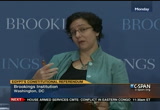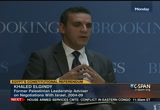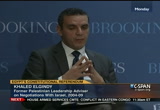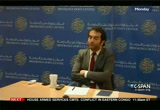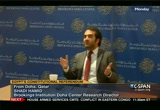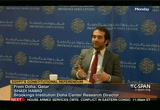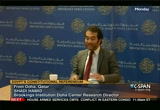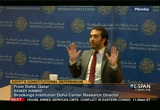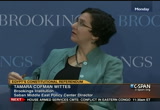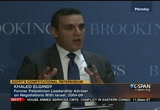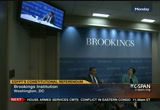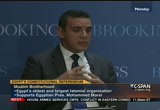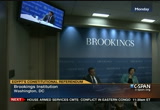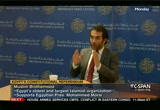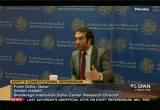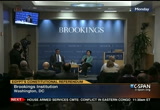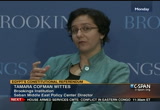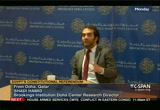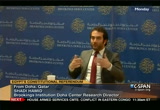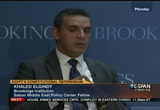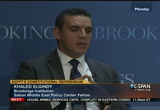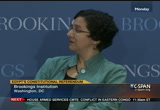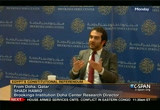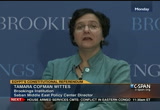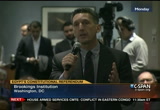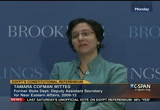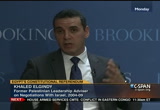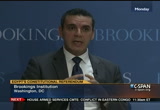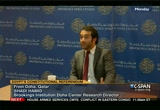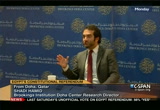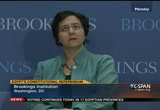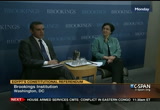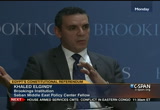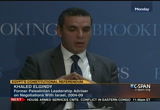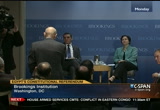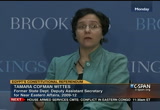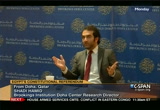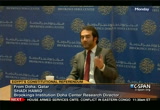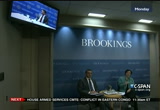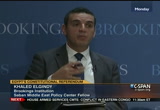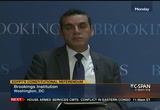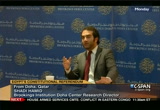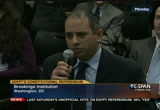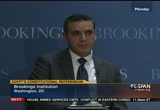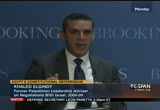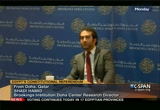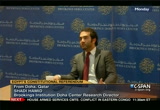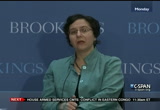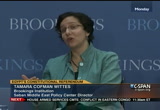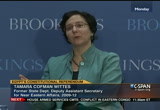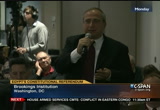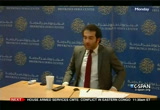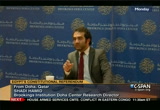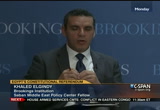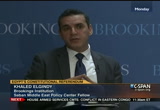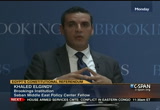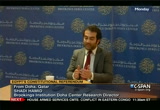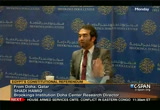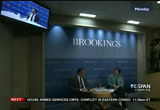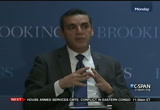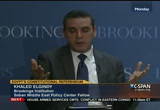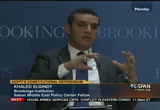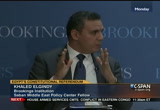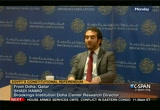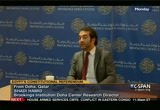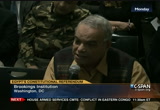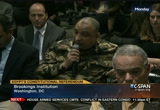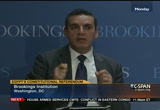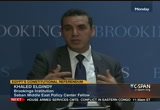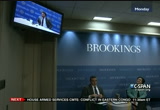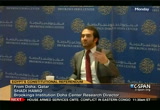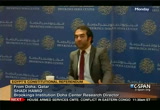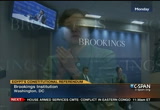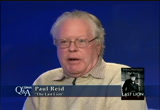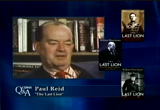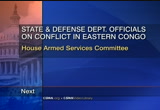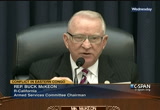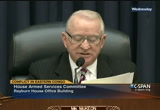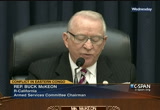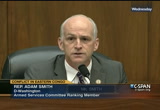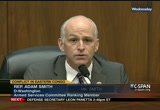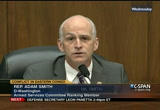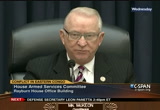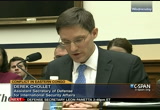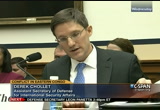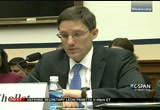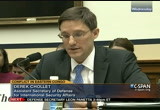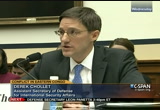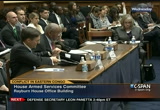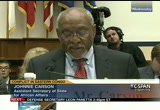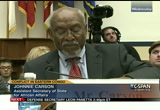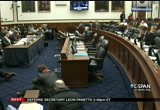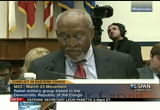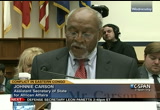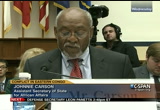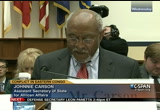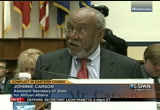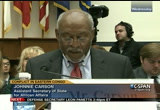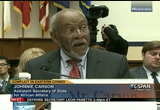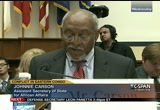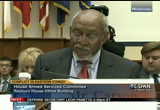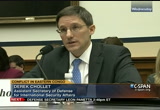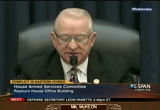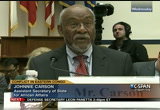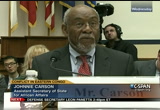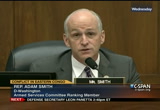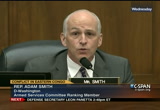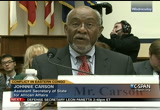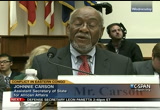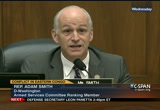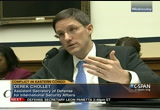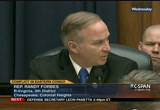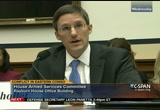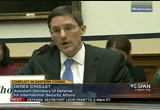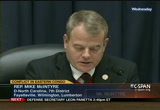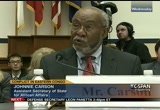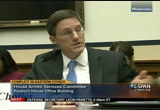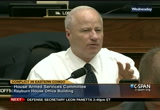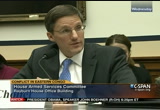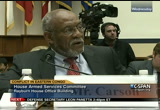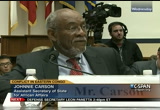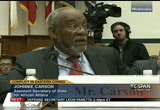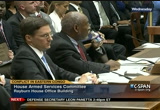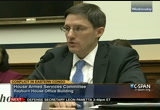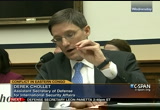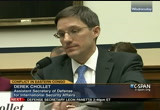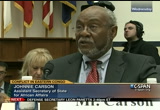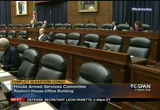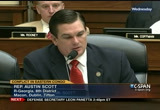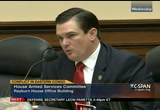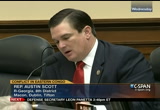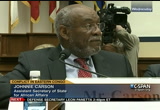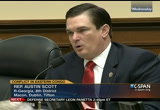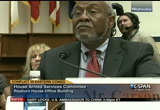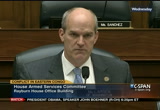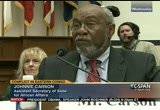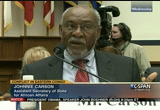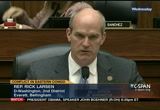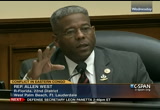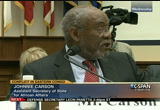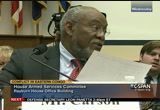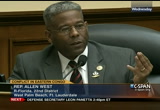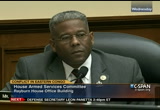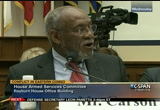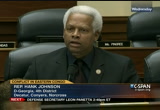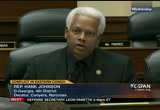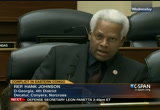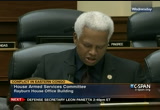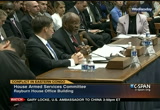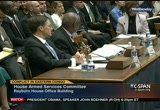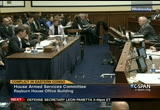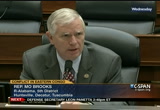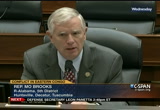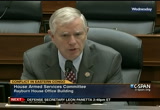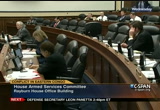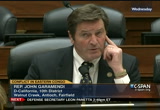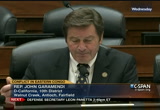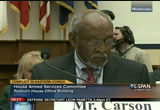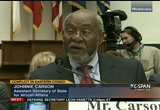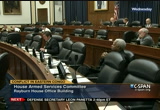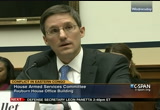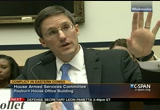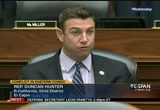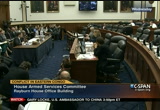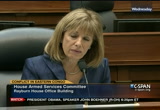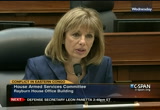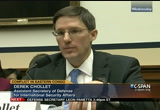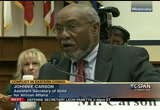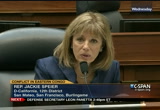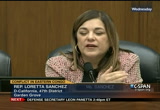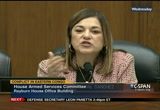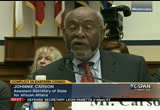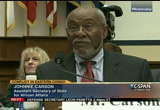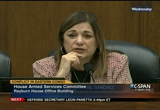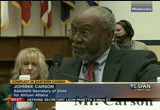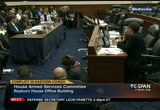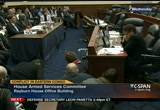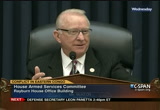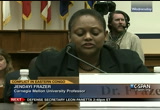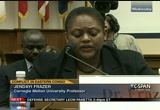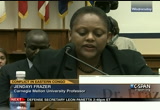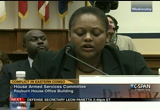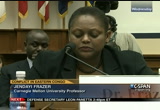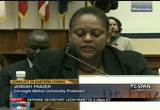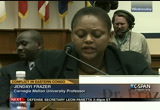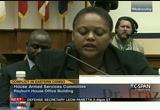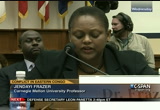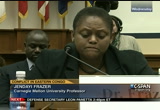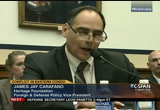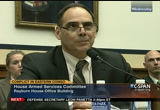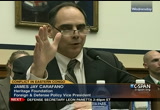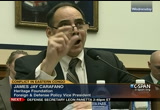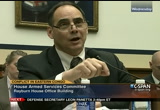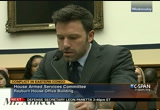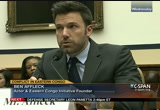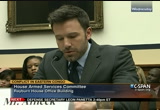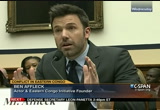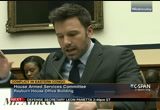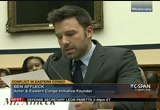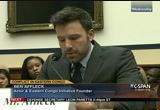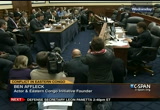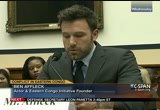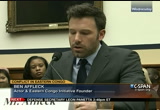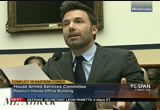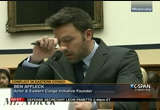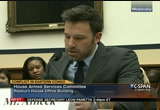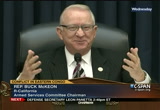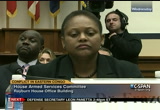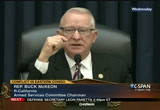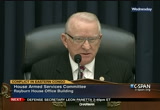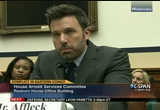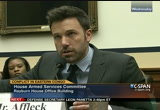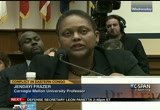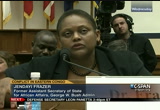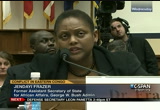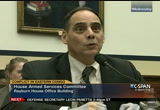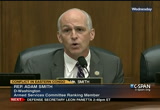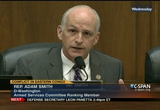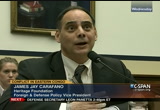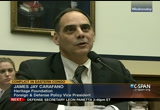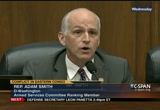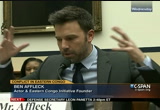tv Washington This Week CSPAN December 22, 2012 10:00am-2:00pm EST
10:00 am
their new political e book the end of the line, romney versus obama. and the 34 days that decided the election. that's coming up on tomorrow's edition of the "washington journal." i want to thank everybody for participating in today's program. we'll see you again tomorrow morning at 7:00 a.m. eastern time. [captioning performed by national captioning institute] [captions copyright national cable satellite corp. 2012] >> net and discussion on the referendum vote in which continues this weekend. the house hearing on violence in the eastern congo tiff after that remark by leon panetta.
10:01 am
the muslim brotherhood current a victory and the first round of voting on the constitution must weaken. monday experts reviewed the latest and spoke about what they may mean for the future of the country. the brookings institution and the state department official>> thank you so much for coming on a rainy monday morning. can everyone hear me? is this microphone working? in the back? good. okay. well, welcome to the saban center for middle east policy at the brookings institution. we're here on the monday morning after egyptians began, although they haven't finished, voting on whether or not to
10:02 am
approve the draft constitution produced by the constituent assembly over the last several months. we're going to talk today about how that constitution was drafted, about what its content says. but what i hope we'll be able to focus on in our discussion is not only how we got here but what it means for the future. if we're learned anything over the last two years of watching egypt undergo this rollercoaster ride of a political transition, we've learned that it's not going to be smooth trajectory. and so it's crucial to look at each of these turning points, including this constitutional referendum, not merely as some kind of milestone on a path but as something that is going to shape a competition over egypt's future and over the shape of the state and the control of the
10:03 am
state, a competition that's going to be going on for some time to come. i'm delighted that we have two fantastic experts with us to help parse the meaning of these developments. we're joined from doha by our colleague, shadi hamid, and here in washington, by khaled elgindy. you have their biographical information in the packet that you received when you walked in. suffice it to say that these two gentlemen have been following egypt's politics very, very closely from well before the revolution. and you can also find a number of their recent writings on the brookings website. we've got a special page on egypt set up on the brookings website that collects all of our recent commentary.
10:04 am
let me start by just giving you a little bit of a sense of where we stand today with respect to the constitutional referendum. the outcome, of course, is still undetermined because only part of the country voted on saturday. the other governates will vote next saturday. what we know. turnout seems to have been relatively light, maybe as low as 30 or 35 percent. the results that have been released so far indicate that slightly over half of those voting support or approve the constitution, the draft constitution -- 56-1/2 percent according to figures i saw this morning. i have to note that this includes -- the voting on saturday included the largest urban centers in egypt -- cairo and alexandria. the voting next saturday will
10:05 am
include more of the rural areas of the country, and in the pre- vote handicapping it was expected that we would see a higher negative vote, a higher no vote in the urban areas where the political opposition is more mobilized and a higher yes vote on the referendum in rural areas where the brotherhood, it's been demonstrated over the last couple of years, has been able to turn out more of its own supporters. now, there's been a lot of focus on how this constitution was drafted and how we got to this referendum. i think the events of the last month show clearly that at least those egyptians who are eagerly participating in their country's politics are very divided on basic political issues. it's also clear that neither the freedom and justice party, the muslim brotherhood's party, nor the political opposition, feel the need at this point to seek compromise in the face of that polarization.
10:06 am
rather, as one observer noted to me last week, both sides seem with this referendum to be going for broke. i think what i'd like to open with in this conversation is what the events of the last month or so represent, what they mean for egypt's future. i'm going to ask our two experts a series of questions, have a bit of conversation up here on the dais, and then open it up to all of you. and khaled, if i may start with you, i think a lot of, as i watch the controversy that's erupted in egypt over the last month, a lot of it has been about the process, almost more than the substance of this constitution. not only the process of drafting the constitution -- who was in the constituent assembly, who walked out, whether
10:07 am
it was rushed, et cetera -- but how that process delineates the divisions in egyptian policy today. can you talk a little bit about what upset people so much? why this process was so controversial and what it says about those divisions inside egypt? >> in terms of the substance? >> in terms of the process and the substance. >> well, on the substance there were some real divisions. there is, of course, the debate about the role of religion in a second republic, in a postrevolutionary egyptian state. and there were some new elements introduced that hadn't existed in previous constitutions. there was a larger role carved out for religion with a number of articles in the constitution. that had been controversial, not so much for what they did but insomuch as i think more than as much as they were in what they allowed for. so you had, for example, article 2 is the standard
10:08 am
iteration of the role of sharia -- the principles of sharia in defining legislation, but you also had article 4, which allowed for a role of the al-azhar university for the first time, which is an unelected body, a religious body that issues religions opinions. and so this role was very vague, but it was enshrined in the constitution. you also had probably the most controversial is article 219, which attempted to define what principles of sharia actually meant, and in doing so i think the wording, of course, is very vague and i would say it doesn't open -- it doesn't create a religious state, but it opens the door to a religious state that could be enacted through future legislation. so there was a controversy on the role of religion. there were also controversies on
10:09 am
the role of the military. the military, by and large, kept its status as being above the low, beyond the reach of the state, not a transparent institution, and certainly not subject to civilian role or oversight. that was the key, i think, point of grievance for a lot of liberals and especially for the revolutionary groups in egypt which saw the military, of course, playing a very insidious role throughout the transition, as well as them propping up past regimes. the rights environment i think you could argue was, you know, could go both ways. there was new language added about nondiscrimination, about protection of minorities, equality, but there were a lot of caveats like as prescribed by law that were kind of these catchalls that again opened the door to future abuse or limits on citizenship or on citizen rights.
10:10 am
>> so rights were articulated but not guaranteed? >> rights were articulated but not guaranteed, and actually open to constraint and to limitations through future legislation. overall, the system didn't change dramatically. you still had a very highly centralized form of government, still very, very presidential, although it is theoretically a mixed system. it still leaves most of the power in the president's hands. and so in terms of the structure of government institutions and checks and balances, there hasn't been a whole lot new introduced. in terms of the process, i think this is where it has taken a bad situation, ordinary controversies, what might have been considered ordinary controversies, and actually made the situation much worse because at each stage the process was fundamentally flawed and only became more so over
10:11 am
time. and we can get into details but i don't want to dominate. >> okay. so if i understand you correctly, you're saying a lot of these controversial issues in the draft constitution were inevitable controversies, but the way in which they were ultimately decided made them bigger controversies even than they would have been. >> made them bigger.
10:12 am
and i don't want to downplay the significance of these controversies. obviously, you know, for a lot of the revolutionary groups enshrining a role of military, you know, having the military immunity enshrined in the constitution is very problematic, and it's very problematic from a democratic and rule of law standpoint. so i don't want to downplay the significance of these at all, but they might have progressed differently. the substance might have come out differently had the process been different. >> okay. let me take that insight and turn to shadi at the brookings doha center and ask you, shadi, given the way in which this process unfolded and the polarization that
10:13 am
resulted which you wrote about in a recent piece for foreign policy magazine, that the polarization around the constitution actually reflected in your view some broader divisions within egyptian society. the next step in this competition, if you will, within the egyptian polity, is going to be parliamentary elections, which as i understand it are supposed to take place just a couple of months after the constitution is approved, assuming that it is ultimately approved. what can you tell us based on what we've seen over the last couple of months about how the competition for parliamentary elections is likely to shape up? >> sure. thanks, tammy. so, yes, in theory there is supposed to be parliamentary elections within two months. i think the big question here are liberals and non-islamists
10:14 am
going to be brought back into the democratic process or are there still going to be elements that say the whole process is flawed, rigged, illegitimate, and they start to withdraw. and there was this debate in the lead-up to the referendum where you had parts of the opposition saying boycott because they don't want to grant legitimacy of the process in the first place and others saying, well, let's try to get our voices heard and limit the margin of victory. so we may have a similar debate for the parliamentary elections, but i think at the end of the day, the major liberal parties are going to participate. i think in some sense, the result that we saw yesterday -- 56 percent yes -- should actually embolden the liberal opposition. the predictions, at least from the islamist side were significantly higher, so they're seeing this as a low margin and they're concerned about that. so with that in mind, if they can get 44 percent, that shows that they're able to translate some of the mass protests we saw last week into some electoral mobilization. now, i think it's easier to get people to vote no, one word, than to decide to vote for which liberal party or which leftist party, because we have to remember the opposition itself is very divided. and the three leaders of the opposition right now are people who have very little in common. we have a neo-nasserist
10:15 am
socialist. we have amr moussa, who doesn't really have an ideology but we can maybe call him neo-fallul. then we have hamid obaragi, who is a liberal's liberal. so these are people who don't necessarily agree on a lot except their opposition to the brotherhood. so i'm skeptical they're going to be able to have a unified front in the parliamentary election. and that's a big problem because that's going to hurt liberals and leftists as a whole in a pr system where if you divide the vote too much then that depresses your representation. and again, you know, there still is this concern about their ability to mobilize, as you pointed out, tammy, outside of the major cities. they haven't really been able to prove that on a district by district level. in contrast, the brotherhood and the salafis have that presence in every district. they have their people who are mobilizing the vote and getting their supporters out. so i think it's going to be challenging, but at the very least, liberals and leftists should be able to improve upon the result last year.
10:16 am
they only got about 20 percent in the previous 2011- 2012 elections. so 20 percent, they can improve on that, but the question is are -- i think liberals and non-islamists in egypt have a tendency to miss opportunities and to not build on their successes. so there's a real question of whether or not they're going to be able to sustain momentum over the next two months and really get their act together organizationally speaking. >> thanks, shadi. you know, you talked a lot about the competition between liberals -- although, as you note, there's a lot of differentiation within what we're calling the liberal camp or the opposition camp -- and the brotherhood. but there was also, both in the last set of elections and in the constitutional debates, competition within what we might call the islamist camp, between
10:17 am
the brotherhood and islamist groups further to the right, salafi groups. i wonder, khaled, perhaps first, if you can talk a little bit about what we see in the constitution. what does it show us about where the salafis got what they were asking for and where the brotherhood got what it was asking for in that competition? >> yeah. i think a lot of the process has been dictated by this intra-islamist dynamic, particularly the muslim brotherhood's almost obsessive fear or concerns about the salafis, who are obviously much moreand so that has tended to push the brotherhood further and further to the right in terms of their decisionmaking. and that also has to do with the fact that the brotherhood is generally dismissive of the liberal non-islamist opposition. and so they see the greatest political threat to their political base coming from the salafis.
10:18 am
and so we see the introduction of things like article 219, which was a nod to the salafis but without giving them as much as they would have wanted. and there were even some concerns that salafis might actually vote no because they didn't see enough religion or sharia in this constitution. of course, i don't know for certain. i doubt that that's the case. i think both salafi parties and the muslim brotherhood have defined this referendum in very stark religious terms. that is what they've used to mobilize this vote. they've even resorted to sectarian tactics. so for the islamists, it's very pro sharia, anti-sharia, pro- islam, anti- islam. this is the way that the battle has been couched or framed in the egyptian -- in the political environment in egypt.
10:19 am
>> of course, it's easy to do that with a constitution where you're voting yes or no. as shadi pointed out, once you get into parliamentary elections, that competition within the islamist camp might open up. right? >> right. >> and it's a question of who can claim most credibly to represent the true vision of islamism or of an islamic state. shadi, what do you expect? there were some people who argued that the brotherhood gave the salafis too much in the constitution because they wanted to scoop up some of the vote in the parliamentary election. what do you expect to see in m.b. salafi competition in the parliamentary race? >> yeah, well, it's worth noting in the constitutional debates the brotherhood felt sandwiched. and the salafis were putting a lot of pressure on the brotherhood from the right, as khaled pointed out, and there was actually just until fairly recently, the salafis were threatening to withdraw, either
10:20 am
withdraw -- sorry, to vote on for the constitution because they felt it wasn't sufficiently islamic. so some of them wanted to have article 2 to be more explicitly about the rulings of sharia instead of the principles. so what i would actually argue is that this constitution, for all its faults, is a compromise between the liberal vision of a constitution and the salafi vision. it's somewhere in the middle. and that makes sense because the brotherhood members were the median voters in the constituent assembly. and this shows how the presence of salafis drags the whole political spectrum to the right. and i do think there are real deep divides here in the sense that how do you split the middle between a liberal vision and a salafi vision? they're obviously very far
10:21 am
apart. and liberal by definition in a set of rights and freedoms that are nonnegotiable. so it becomes difficult to see how you come up with a resolution that pleases both sides. and i think that's going to be a general problem that we're going to keep on seeing come up in some of these controversial ideological debates. now in terms of the brotherhood-salafi relationship and how that's working out, even though they work together and are increasingly working together, the brotherhood looks at salafis like little brothers who, you know, who cause trouble and sometimes you've got to keep them in line. they've got to have their time out. they have this kind of paternalistic tone. and i've always noticed that. in private conversations with brotherhood members and leaders, this really comes through. there's a sense that these salafis, where did they come from? they just started politics back here. we've been doing politics for 80 years. so there's definition that part of it. now, salafis also don't like being treated in that kind of way.
10:22 am
they want to be greeted with respect obviously s they kind of -- so they have their own issues with the brotherhood. one example of this was after last year's parliamentary elections, i remember i was in egypt at the time and they were having negotiations between different factions. and salafis and liberals were actually having negotiations about possibly forming an anti- brotherhood coalition in the parliament. that's how -- the salafis were so afraid of being dominated by the brotherhood and not having their voice hear, that they actually thought about joining hands with their liberal enemies. so there is this kind of undercurrent of distrust. now, i think one of the important things about the crisis of the past month, since morsi's decree, is that it's polarized egypt more strictly along islamist-non-islamist lines. so now it's going to be much more difficult to peel the brotherhood off from the salafis.
10:23 am
they're kind of intertwined with each other, now more than ever. and they have -- they were talking about a potential electoral alliance as recently as october. those negotiations went on for some time, they stalled, but there is some interest on both sides to explore that. the brotherhood though is probably going to wait to see -- and they've actually -- one of the brotherhood leaders, katani said recently, actually on december 4, that they're still open to having an alliance with liberals and leftists, that they'd want to reach out. so we're still hearing that kind of rhetoric. i think the game plan from their standpoint is ask the liberals to join with them. and if the liberals say no, as they almost certainly will, they can say, "well, we tried. we gave it our best shot. i guess we're going to have to stick with the salafis." >> you know, i think this raises an interesting choice that the brotherhood faces. let's assume for a moment that
10:24 am
the results that we saw from saturday's voting hold in next saturday's voting, so that we see the constitutional approved but by a somewhat slimmer than expected perhaps margin. so the brotherhood then faced a choice. do they say, well, victor is victory. the constitution we favored passed, and that's a mandate for us to go forward along the lines that we've been moving along despite all these protests in the street. or do they say wow. this suggests that there is some deeper opposition to the vision we've been putting forward and the program we've been putting forward and we need to reach out. i'd like to ask each of you what do you expect their choice might be, and how do you think they ought to think about it, assuming that, like all political parties, they want to stay in power? khaled.
10:25 am
>> well, i would expect, you know, the brotherhood is a majoritarian party. they are probably -- they believe in majoritarianism in its purest form. a 50 percent plus one victory is a victory, whether it's the constitution, a founding document, or a piece of legislation. i don't think -- i don't think they have yet, at least in terms of their actions don't seem to reflect, the nuance that goes into consensus building and that sort of a thing. and as far as their preference or stated preferences in the present or in the past for a coalition with liberals, my own view is that train has left the station. i think there is so much bad blood now between non-islamists and the brotherhood that that's probably not in the offing in the short term.
10:26 am
and i think we will probably see more and more collaboration between the brotherhood and salafis, and that has been the trend. there has been this polarizing trend. there have been a number of groups, revolutionary groups and liberal groups that endorsed morsi for president against hamid shafik, who they saw as someone who represented the old regime and desperately did not want to bring that back, and they feel extremely betrayed by the brotherhood's decisions and by president morsi's decisions. and i very much doubt that they'd be willing to go down that road again having already been severely burned over the course of the last month. >> so, for that group of people, this referendum is a referendum on the brotherhood, not just on the constitution? >> i think so. i mean, i think overall this was not -- the vote was not on the substance of the referendum. people didn't have time to read it. there were 230 some articles. and, you know, you're talking about a very accelerated
10:27 am
process. so it was really about the polarization. it's about how you felt about where the transition was headed and where -- whether you support president morsi or you opposed him. and i think the calculation, you know, all signs have miscalculated throughout this two year transition, but you know, where the brotherhood miscalculated is that they fundamentally forgot how president morsi was elected. and that is he could not have been elected without a substantial number of revolutionary and non-islamist voters voting for him. and so i think they will pay a price for that. and i think they are paying a price for it politically. i think we're likely to, you know, part of the problem -- i just want to throw this out there because i think this is a bigger problem that goes beyond just the last two months. part of the problem with this transition is that it's essentially been a game with no rules, and a game with no rules in which the winner of the game
10:28 am
gets to make all the rules. so that has been -- that has made for very kind of winner take all, zero sum kind of a political environment, which i suppose is okay at a certain point down the road when you've got ordinary politics. and there are winners and losers. but to treat the constitution and the defining of the state as a winner take all process i think is fundamentally and deeply flawed. and probably portends more instability down the road. more polarization and more instability. >> okay, shadi, there was an article in the new york times -- i think it was on friday -- in which unnamed u.s. officials were suggesting that morsi might have learned from the last couple of weeks that winner take all is not the way to go and that he needs to reach out to his political opponents.
10:29 am
do you think that the brotherhood understands this referendum as in part a referendum on the way it's running politics in egypt? >> to some extent yes, but i think there's a bigger problem here. the brotherhood is in full existential mode. they're extremely paranoid. they believe that opposition is out to destroy them. they think liberals are anti- democratic and are out to bring down who they view to be elected and legitimately elected president. so they're very much in that mode of thinking. and that's why essentially one of their justifications for the authoritarian november 22 decree is -- and brotherhood leaders actually told me this -- is yes, we know it looks bad, we know it's kind of anti- democratic, but the normal rules of politics are suspended until future notice because we are in this fundamental turning point, and this is what we have to do. and sorry if people don't like
10:30 am
it. now, i hope that they've moved beyond that stage. i'm not convinced that they are. and as khaled said, it's so polarized now, and especially with blood spilled, which we saw two weeks ago outside the presidential palace. when each side is claiming martyrs, you kind of get to a point where the wounds are still too fresh. so i think that morsi and the brotherhood will at least rhetorically say opposition, please come. let's sit down and talk. as morsi did last week in the so-called national dialogue. the problem is liberals aren't going to trust him. they're not going to believe that he's negotiating in good faith, unless he can somehow convince them. now, i don't really know what that would look like, but that's the real challenge here.
10:31 am
so for that reason i wouldn't be very optimistic. now, the positive spin though is at some point they're going to have to sit down together because the opposition doesn't have a lot of options. they can keep on trying mass protests every tuesday. that's not a long-term strategy. the question is what do you do afterwards? either you decide to work within the system, however flawed it is, or you withdraw from the system and then you say morsi is illegitimate, the constitution is illegitimate, the process is illegitimate. then you get into a kind of revolutionary situation which can be very dangerous. i hope the former is what happens, and i think that would be the smartest approach. i don't know if the revolutionary option is realistic, feasible, or is likely to succeed. >> thank you. before i open it up to the audience, there's one other issue that i think is really striking about this constitutional text that khaled referred to and that i wanted to delve into in a little bit more detail, which is the role that has been established for al- azhar. this is unprecedented in
10:32 am
egyptian history, and in terms of setting precedence for these new arab polities in an environment two years after the arab awakening, it's creating a role for a nongovernmental religious institution, which granted has been a preeminent source of islamic scholarship for generations, but it's granting in a role in reviewing legislation. not approving legislation, but having some sort of unofficial input. as you noted, it's vague. i wanted to ask you both how is this provision viewed by the egyptians who supported and imposed it? number one. and number two, what does this say about the future of religious institutions in an environment of political competition? should we now expect that al- azhar will become a forum for competition between different versions of islamism.
10:33 am
i think there have been a number of reports over the last week about a warning by king abdullah of jordan, about an alliance of extremism, emerging across the region. and there are those that make the argument that the next battle over religion and politics in the middle east is going to be fought in institutions like al-azhar. so i'd really love to get each of your thoughts on that. shadi, do you want to start? >> yeah, sure. so pretty much the way this might look -- part of the problem is that this article, as khaled said, is vague, and it can be interpreted in different ways. and parliament can decide to operationalize it in different ways. but i think what we can expect is members of parliament essentially submitting controversial laws that have religions content to [inaudible] for an advisory opinion. the opinion will come back. it will be nonbinding, but salafi's, and to some extent the brotherhood, are going to use that advisory opinion to
10:34 am
build support or to oppose a given law. and it will be difficult, i think, for salafi's in the brotherhood as self-proclaimed defenders of the islamic fate to say no to the most prestigious and the islamic institution in the middle east. so i think, yes, it's nonbinding, but it does kind of push the discourse in parliament in a more religious direction, and that's the round that salafi's like playing on. they like it to be about different religious views because, you know, it's hard to be more salafi than the salafis. and that's what they're banking for. so i think that is the real worry, the real concern here. but to be honest, i think article 2 opens you up to that, and that's part of the art of why you need this al- azhar clause, because if you're saying
10:35 am
that we're going to take article 2 seriously and that the principles of sharia i should be the main source of legislation, who interprets the sharia? so then it follows that al-azhar or some other religious body plays a role. >> khaled? yeah, i think it's problematic on a number of levels. i think, you know, shadi referred to al-azhar playing a role in deciding on controversial religious content. well, what constitutes religious content? i think the nature of television programming and the kinds of ads, for example, that people see or the nature of certain kinds of speech, these are very -- for salafis certainly, would all fall under religious content. everything essentially falls under religious content. so it's impossible to know where
10:36 am
those lines would be drawn and if the debate -- if the discourse is being dictated in a sense or driven by the most conservative elements in that discourse, the salafis, then we're likely to see more and more conservative types of interpretations over time. so, like i said before, the article itself doesn't necessarily create a religious state but it certainly opens the door depending on the political dynamics, the nature of a future parliament, the balance between the sunni islamists and so forth. and the second thing is that we are likely to see an islamist competition over the very institution that is playing this role, and that obviously the brotherhood and the salafis clearly have an advantage in that as far as i know liberal groups don't have -- it's the one place where they're at a distinct disadvantage in a religious institution like this. there are, obviously, and al-
10:37 am
azhar has a tradition for its sufi origins and a number of sufi sheiks affiliated with al- azhar have been at the forefront of the revolution. so there are revolutionary olima as it were, but over time i think the brotherhood and the salafis would see al-azhar as another pie to divvy up between them. and it would become too tempting for them not to. so i think those are two real dangers that we face in the future. >> now, under mubarak, the head of al-al-azhar was appointed by the president. is that right? is that going to continue to be the case in this constitution? do either of you know? >> well, i don't think it's spelled out but i think there is draft legislation that's being considered or was being considered on al-al-azhar.
10:38 am
i think, you know, shadi will correct me if i'm mistaken, but i think the brotherhood would like to see direct election of the al-al-azhar olima. and why not? that's the one thing that the brotherhood does better than anyone else is retail politics and elections. is that the case, shadi? >> yeah. so, the brotherhood's official position in its programs before the revolution, and i believe it was also the case in the subsequent ones, is that moving away from the appointment system where you have active government intervention in al- azhar and actually have the supreme body of laws that are elected by the general assembly of al-azhar. so it would be kind of coming within the al- azhar institution itself. and again, you know, the brotherhood likes elections. so part of the problem though is that the brotherhood has flip- flopped on a lot of the positions it had when it was in the opposition.
10:39 am
it used to be for a ceremonial president. it used to be for a weak executive with strong local governments and regional governments. now it's really shifted. so just because the brotherhood supported something before doesn't necessarily mean it's going to be consistent. and i guess that's politics. but it is striking to see how they've shifted, especially on the presidential issue, for example. >> okay. thanks very much. with that i'm going to open it up to our audience. now, we've, of course, spent most of our conversation up here talking about actors in egypt, what's going on in egypt, the competition between those actors. one issue we haven't touched on is the role of outsiders including the united states. so i welcome any questions on that. let me just ask you, please, two things, if you want to raise your hand. number one is identify yourself, please. and number two is, out of respect for everybody else who
10:40 am
wants to engage in our conversation, please keep it brief and keep it a question. a question, that's one. and why don't we start right there. adriana. >> thank you. my name is edward joseph. i'm with johns hopkins sais. great to be here today. great discussion. in fact, i'd like to quote further on a comment that shadi made about the legitimacy of the document, which to me is the key question. and after all, we were talking about a referendum on the constitution, it's not a referendum on a law. the constitution is the foundation for egypt's democracy. and if i could, shadi, ask you and khaled, to probe further, assuming of course that it passes, which is very likely to happen, do you believe that fundamentally egyptians across the spectrum will accept this constitution as legitimate? even if they decide to participate in parliamentary elections which shadi raised as a possibility, even if they decide to participate, will they say, "yes, this is our constitution. it passed.
10:41 am
i may not like it but i accept it." just to round the question out, is there a sense at all among liberals that, "hey, we were the ones fighting this revolution. you guys were 'johnny come lately. we were the ones who were there at the beginning and this is our revolution," and in that sense make it even more question the legitimacy. >> okay, thank you. i think there are a couple of issues embedded in there. one is with low turnout and a narrow margin, is it a legitimate constitution? and the other is will those who end up in parliament take this
10:42 am
constitution as a given? or are we immediately going to see efforts to amend it? as i understood it that's part of the question as well. khaled, do you want to start? >> yeah. i happen to believe that this is a constitution that will probably pass, but it will be a very, very weak legitimacy. i think all of the problems that we saw over the last month -- the controversy, the violence, the bad blood, obviously the polarization, the delegitimizing of one side of the other -- it is being built into the system. this instability is being built into the system. and so i think, and we saw it on election day, the rushed nature of the vote. there were lots of irregularities, not necessarily out of a desire to rig the vote but just simply because there weren't enough judges to cover polling stations. judges were covering more than three times the number of voters they typically cover per ballot box. so that's why you had such huge lines. so there were a lot of irregularities, a lot of
10:43 am
violations, both real and perceived. and i think it certainly casts a doubt, if not question the very legitimacy of this document. and at the end of the day, you know, as tammy said, it was passed by -- assuming the margin stays relatively similar, but the turnout was very, very low. it was around 34 percent. so we're talking about a document that a third of egyptians voted on, almost half of whom said no. and that's a very questionable document in terms of its legitimacy. and i think that will be reflected. i would expect there will be opposition participation in future elections, even if they consider it illegitimate. i think the decision that they made not to boycott, even though they saw the process as illegitimate, is emblematic of this. you know, you can have these seemingly contradictory positions. you participate. you know, the brotherhood and other opposition groups during the mubarak era participated in
10:44 am
a political process that they, by and large, deemed to be illegitimate. but they participated anyway. so i would expect we would see more of that. the participation of the opposition would be independent of their views of the legitimacy of the process and of the constitution. >> shadi, anything to add? >> yeah. so part of the problem is that, yes, they will likely see the constitution as illegitimate, but there isn't a whole lot they can do after it passes. i mean, part of the bind that the opposition is in is that by actually participating somewhat enthusiastically after kind of hedging a little bit is that it's difficult for them now to come and say, "well, we got close. we lost but we don't recognize these results." i mean, the only way they can really make that argument is if they withdraw
10:45 am
now, and they may have some basis for that. they've cited irregularities, violations. so if they withdrew now then that argument would be stronger. but if they stay and participate in round two, then i think it will be -- that argument is not going to be as effective with the egyptian people. now, they can try to amend it but the problem is they're never going to -- i mean, for the foreseeable future, liberals and leftists and non-islamists are not going to have a super majority in the egyptian parliament, so that's not a viable option. one possible scenario, and the vice president actually suggested this the other week, is that after the constitution would pass, they could then have kind of sideline negotiations on the contentious articles and kind of do it in that way. so i guess there's really maybe four to six really contentious articles that people have issues with to sit down and try to iron that out, get the opposition onboard. i'm skeptical but that's perhaps another option. and lastly i'll just say the question on the issue of
10:46 am
legitimacy and revolutionary legitimacy, i think it's worth noting that the original revolutionaries on january 25th were not necessarily liberals. they were revolutionaries. may of them were leftists, socialists. the liberal parties didn't actually join until when the brotherhood did, and the liberal parties weren't very well respected anyway. so i think in that sense some of the people we're talking about here have equal claims to legitimacy. the brotherhood did join the protest fairly early on on january 28th. >> okay, thanks. a bunch of questions up here in the front, adriana. why don't we start with gary mitchell? >> thanks very much.i'm gary mitchell and i write "the mitchell report." >> i'm not sure people can hear you, gary. adriana, do you want to check the mic?
10:47 am
there we go. >> anyway, i want to interrupt this graduate school seminar on the egyptian governance and ask a question. and that is can you give us at some point in this discussion a kind of overview, a civics 10overview of what kind of government is it that has been created? how is it like the united states and how is it different from the united states? just some sense of what this animal looks like and what some of its powers are. >> khaled, do you want to take
10:48 am
that on? >> well, it's like the united states in that the parliament is comprised of two houses called the house of representatives and the senate in the new constitution. but that's the extent of the similarity. it is much more like the old egyptian system where you have an extremely powerful presidency. there are probably more checks -- potential checks at least from the parliament to play a bigger role, but it is not a parliamentary form of government. it is technically a mixed form, presidential and parliamentary. but it's the president who determines -- who appoints the prime minister. so the prime minister is still at the disposal of the president, just as under mubarak, even though he may come from the majority party in the parliament. so there isn't really a balance between the prime minister and the president because the prime minister is a functionary of the president, he's carrying out the will of the president. >> okay. do you want to say anything about the role of the judiciary since that was one of the other
10:49 am
major controversies in drafting this? >> well, i think the role of the judiciary was largely kept intact, but the brotherhood, i think, also envisions a major overhaul of the judiciary. so we're likely to see less judicial review than -- well, i mean, it depends because the judiciary itself is divided over this constitution and over the process and hasn't -- i mean, they're not necessarily speaking with one voice. but i think that the judiciary and sort of bringing the judiciary under control has been a goal of the brotherhood for a long time and i think we're likely to see that in future legislation. traditionally, the judiciary hasn't played a major role in challenging the executive, and i think we'll continue to see a very conservative judiciary in that sense. >> thank you. professor oweiss.
10:50 am
>> ibrahim oweiss, georgetown university. i would like to ask a direct question -- >> adriana, i'm sorry. yeah. >> ibrahim oweiss, georgetown university. i would like to ask a direct question. when the current stalemate continues, and if it will continue, how much can egypt afford instability in terms of the food supplies that the egyptians could have? i'm afraid, as i had voiced many years ago, i'm afraid that it will be a revolution of the hungry, like the french revolution.
10:51 am
so instability is a very serious matter and the impact of it on the economics, the lack of resources that egypt has. tourism has declined. i don't have to go down the list of all of the things that have happened as a result of the instability, but there is a very serious outcome, whether or not yes had won or no had prevailed. thank you. >> thank you. okay. so for those of you who are unfortunately beset by the leaf blower in the courtyard, the question was about the impact of ongoing instability and the confrontation in the political system having exacerbated a very difficult socioeconomic situation. one of the things that we saw over the last couple of weeks was egypt was on the point of getting a loan from the imf of nearly $5 billion, which would have been a significant vote of confidence in the egyptian economy, help to stabilize the
10:52 am
economy. because of the crisis that has now been pushed off yet again. and so how do we expect the political confrontation's impact on the economy -- the stock market also took a nosedive over the last month -- how do we expect the economic impact to play into the parliamentary elections and this competition as it goes on? shadi, do you want to start? >> yeah, sure. well, so i think the imf loan is still going to happen. the question is when. i think there is a realization that egypt is too big to fail, although the obama administration doesn't have a political vision for egypt and isn't really interested in engaging on that level, so for them it's help the economy. that is really the obama administration's policy as far as i can tell. so i think the international community is still committed to seeing that through. the question is how is morsi
10:53 am
going to handle that? and we just saw the recent situation where he raised taxes and then his own party, the fjp, criticized and then others criticized him, and then you see him pulling back. part of the problem is to really be able to engage in these economic reforms you need to have some degree of societal outreach and consensus, and unfortunately, morsi has not shown a strong suit for that. and we're also talking about a presidential office that is very understaffed. they're over their heads. they're learning on the job. so there is also this issue of incompetence, which is why i think going forward morsi is going to have to rely more on the brotherhood because they actually do have some of the expertise, some of the business acumen, to be able to work on these controversial economic issues and to also build support on the street for some of these economic initiatives.
10:54 am
i think it's worth noting that up until november 22, mohamed morsi was still consulting with the brotherhood and the brotherhood's leaders, but there was an effort to be somewhat independent and somewhat autonomous. there was a selfconscious effort to have some distance between the two. but that distance is closing because morsi needs the brotherhood now more than ever. and i think that's going to be one of the unfortunate byproducts. it might be fortunate in some ways in terms of being a little bit more effective on the economy, but in terms of societal consensus and reaching out, his close intertwining with the brotherhood may not be helpful. >> thank you. so there's an interesting possibility, in other words, that economic issues might force political compromise by the
10:55 am
leadership in ways that political controversies are not, but you're saying that in practice what we're seeing is a besieged president reaching out to his own party to deliver people for him rather than reaching out to his opposition. khaled, anything you want to add to that? >> yeah. i mean, i agree with shadi. i think it's going to be very hard for the president to reach out beyond his own party because he began by reaching out and addressing his own party. so, you know, he's going to need to go beyond his own base constituency, which is very much, especially in the liberal and left -- particularly on the left side -- very much opposed to neo-liberal policies on economics and the kinds of austerity measures that are going to be necessary and that the imf is requiring. so these are going to be hugely unpopular. and i don't know how you do that without some buy-in from your own political opponents. and i think it's one of the major blunders, i think, of morsi and the brotherhood is to burn essentially all their political bridges with their non-islamist opposition who they will definitely need. so i do see more instability coming. and i've heard the predictions
10:56 am
of the prospect of a revolution of the hungry has been brought up by more than one person and i think is a major concern. i just don't see how he can overcome it without becoming necessarily more authoritarian because he can't reach across the aisle, because people won't take his hand, because they won't trust him. i think there will be more and more of a reliance on the brotherhood, as shadi said, and that necessarily i think entails becoming more and more authoritarian. and probably in order to quell discontent with that we may even see more and more repression. >> if i can just jump in -- >> oh, shadi, you want to add something? >> i disagree a little bit with khaled's pessimistic take there. i just want to offer a little bit of a different view. >> that's good because we need some optimism here i think. >> yeah.
10:57 am
i mean, here's the thing. you're going to have a parliament. you're going to have -- i mean, part of the reason that the polarization got so bad was the judiciary, this fear of the judiciary intervening in politics. and i think once the judiciary is able to take a step back, which i think it will eventually, and once you see an elected parliament with parties that are playing a more active role and there is an institutionalized channel for dissent, i think that egypt's political life is going to become a little bit, at least a little bit less polarized and richer. you know, people can talk about dictatorships all they want. yes. there are major authoritarian instincts on the part and tendencies on the part of morsi, but there is still going to be an elected parliament. so it's not going to be a full dictatorship as some people fear.
10:58 am
so i think it's important to keep things in perspective a little bit. >> okay. so the parliament may bring hope for pluralism. yes, please. >> my name is kay oshall. what percentage of the electorate was able to vote last saturday as opposed to this coming saturday? is it 50/50 roughly? >> okay. a good, quick, factual question. can we hand the mic to tariq just behind you there? >> hi, tarik rodwell, atlantic council. i want to go on what tamara was alluding to, which is u.s. policy towards egypt in this. shadi, you had mentioned that obama doesn't seem to have much of a political vision for egypt. do either of you believe that the way that obama is handling this is the correct way being silent about the politics of it publicly?
10:59 am
i don't know what's going on behind the scenes but how do you see how can the u. s. influence this transition towards a more inclusive -- toward something supporting democratic development? >> okay. so great. first, a factual question about what proportion of egyptians actually were meant to vote on saturday versus this coming week and then u.s. policy. >> i don't know the exact numbers. my guess would be since it's more than half of the governates that voted that it's probably more than half. and since they included the two most largest -- >> populated. yeah. >> -- alexandria and cairo, but i don't have exact numbers. shadi, do you? >> i don't. >> it's probably more than half. >> okay. and the u.s. policy question, khaled, do you want to start? >> on the u.s. policy question, i think, i mean, i agree with shadi's overall characterization of u.s. disinterest, especially in getting into the nuts and bolts and nitty-gritty of this very
11:00 am
messy transition. and i think they probably did good to stay away from any public posture, particularly when it comes to the constitution, which is, as everyone knows, an extremely sensitive moment in the transition. it is the literally defining moment. and especially when it's being pitched in very religious terms or very existential terms it was wise to stay out of that. i don't know that the u.s. could have played a different role actually certainly in their constitutional controversy but even in other aspects of the transition. i don't know that the u.s. could have played a different role. certainly in the constitutional controversy. but even in other aspects of the transition, i don't know that a heavy-handed or aid-conditioned kind of a response would achieve the desired results. i think when you're deal with intense popism on all sides,
11:01 am
deep distrust of american intentions again on all sides of the egyptian political spectrum, i think less is more as far as the u.s. role. i think it was a lose-lose position to get overly involved or seen leveraging the aid. so i don't know that the u.s. could have play add different role than the one that it has. >> i have a different view. i think there's actually quite a bit more the u.s. could have done. but you can't start now. i think in some sense it's too late now. you can't wait until a leader does something thor taryn and then have a pure reactive posture because he's already made the autsdz attorney move. the leverage has to be established early on and i
11:02 am
think the u.s. set a dangerous precedent with letting him get away with murder and terribly mismanaging the situation. i think the real moment of truth the obama could have drew a clear red line and said we are suspending u.s. aid until this is seriously addressed and i think that would have sent a message that the u.s. is interested in the content of egypt's democracy or even later there was a one-week period last june when he was still ruling. reinstated marshall law dissolved the democratically parliament stripped the powers all in a week. the best we could do is express concern. that was another time that the u.s. should have made very clear what its position was. and yet there is a pop list problem. egyptians strong have a pronounced dislike for the u.s. and u.s. policy. but what i would argue is that if that pronounced dislike is
11:03 am
there even when we're playing a hands-off role we might as well have egyptians dislike us and try to do something good in supporting democracy in their country and it could have been really helpful now. if morsi was aware of where the u.s. had its so-called red line, if he had a sense of that before november 22nd, meab he would have thought about doing it differently. >> i'm going to use the chair's prerogative and just add my own two cents on the very good question because i think we've heard two very thoughtful views stability in ejimentjipt is essential for stability in the region and for the stability of key relationships in the region that are of deep interest to the united states. and we saw that very clearly in the way the u.s. very
11:04 am
assertively stepped up in the gaza crisis to work with egypt on stabilizing the egyptian-israeli border. if stabilization is the priority for the united states, then i think we have to recognize that stability is not going to come only from security or only from economic stabilization measures. what's clear to me from the crisis of the last few weeks is that stability requires political compromise as well. and i think we've heard that over and over from my two colleagues. so my argument would be that if the united states indeed prioritizes stability, it has to have a political strategy as well as an economic and security strategy. and i would agree that right now largely it does not have one. in addition to which i guess i would point out that there are a couple of principles that the united states has articulated from the very beginning of the
11:05 am
arab awakening through to today and the question is how well is it doing at implementing those principles in its policy in each particular place around the arab world? one of those is we want to see democratic process and we'll accept the outcome but we care that the process is a good process. and the other is about basic rights and especially rights for women and noishts. and with respect to e-- minorities. and you've heard over and over again from american officials the importance of inclusion of having a broad-based process that incorporates voices from across society to get a result that will achieve consensus. now, that's ideal. not every constitutional process is actually going to be fully inclusive and achieve full consensus. but i think having articulate that had it's incumbent on the united states to render some commentary on whether those principles have been achieved or not in the outcome of the process they see. if it's the process they care about they need to evaluate the
11:06 am
process as they see it emerging. and i find the failure to do that troubling not only because i don't think it contributes to stabet in egypt or to democracy in egypt but i think it reduces america's ability to say similar things in other places around the region and around the world. so i think it's -- it weakens america's position overall on issues of democracy in human rights. so with that editorial comment, why don't we take some questions in the back. i see one here. >> thank you. greg with the center for national policy. my question is dealing with the upcoming parliamentary elections. the last time around the brotherhood got something in the order of 47% of seats which game them the speakership and leadership of key committees in parliament. a lot of people say the brotherhood of course wanths to get that same percentage again because that way they'll hold
11:07 am
parliament again. but given this backlash against the brotherhood and against morsi, the decree in the constitution and everything, if the brotherhood does get that 47% next time, will the people say the election is rigged? and will that then lead to more instability? i was wondering if you could comment on that. thank you. >> well, it's an interesting moment because you could argue if they get less than what they got before it's a loss for them or it could be intprethed that way. do you have thoughts on that? >> a lot of it depends on the -- >> could i ask you if you can pull the microphone lail closer to you, i think we'll be able to hear you better. >> sure. so a lot of it will depend upon the electoral system the brotherhood and islamist in general do better in single member districts so essentially the u.s.-u.k. system because if
11:08 am
it's one facing one liberal the islamist will almost always win. and in the last election they won 82% of the individual seats. and considerably less in the pr seats. now, the opposition as a whole generally prefers straight pr and getting rid of the individual seats. but it's still too early to tell and that's one of the weird things is in the next two months they're going to have to have a debate about the electoral system. i don't know exactly how that's going to work. so part of it depends on that. i think the brotherhood will go down in its vote share, but i wouldn't overstate the drop. again, the brotherhood does best on the district-district level and they have ex parliamentarian whose have personal connections with their constituencies and some are fairly small so there's a kind of personal touch that's
11:09 am
important there. social service provision becomes more important. so on and so forth. so i think for that reason the brotherhood will drop but not as much as people expect. >> so in a constitution with 230 odd articles they didn't fully define the electoral system whether it's single member district or proportional repation system? >> no. i don't think they did. i would expect also to see a drop in the brotherhood's representation in the future parliament as well as probably a boost to nonislamist parties. they're slightly better organized or not as terribly organized as they were the first time around. they have learned some lessons although not entirely. so i would expect them to do a little bit better also. the question on in terms of the rigging, i think the kind of
11:10 am
rigging that we saw under mubarak ballot box stuffing and we had more ballots in the box than number of voters in that district, that sort of flagrant heavy-hand approach, those days are over and the brotherhood hasn't generally engaged in that sort of a thing. where things get problematic and again going back to this idea of the game with no rules, you don't have finance disclosure for example, you don't have a system where transparency is required as far as elections. there are a lot of different thing that is we would consider violation or questionable you know the brotherhood has a vast patronage network, has vast loyalists on the street. there are whole idea of engaging in sectarian discourse that we saw in a number of elections. so there are a lot of practice that is could be deemed
11:11 am
questionable that will work to the brotherhood's advantage. that aren't rigging in the traditional sense. but that i think will cast more and more doubt on the leagetsy of the process. so there are different kinds of quote/unquote rigging or ways at least to stack the deck in your favor and the fact that you get to make the rules certainly is one of them. so -- but i do think though that it's important to underscore the extent to which i think this process is going to be seen as legitimate. i talked to -- or at least its leagetsy will be questioned for a very long time to come. i talked to a judge who is a friend of mine who oversaw these elections over the weekend, and in his words the constitution was quote/unquote still born. and he doesn't expect it to last more than two years. and so i don't know, i don't
11:12 am
question his -- i don't know whether it will or won't last longer than that. but i think we have to have a much more nuanced sense of the kind of instability that is being built into this program. >> thanks. ok, another question in the back. >> thank you very much. i'm with the [inaudible] for the process to be effective you have to have effective policy for the opposition. what are the circumstances or conditions that prevent in ejipt such an alternative? >> ok. excellent question. the opposition in order to have an effective multiparty system you have to have an effective opposition. and as you both discussed the
11:13 am
opposition has proven itself incredibly fragmented and indeed in your foreign policy piece you pointed out that it's made out of groups with very, very different ideologies or basic philosophies. so what are the prospects to see some coherence unified opposition emerge? who wants to start? >> so -- >> go ahead. >> so part of the problem is liberals in particular haven't provided an affirmative vision of what liberalism in the egyptian context means or should mean. so what brings them altogether liberals leftist whatever else, is anti-islamism, that they don't like what the brotherhood is doing for different reasons, they're afraid of religious overreach, infringement on personal freedom so they're
11:14 am
portraying themselves as if you don't like the brotherhood go with us. that can work but that's not a long-term strategy. and i think the chaleeng especially for liberals is going to be articulating liberalism. the problem there is liberal in many parts of egyptian society is a bad word. and to the extent that i remember last parliamentary election some liberal party candidates avoided using the word liberal when they were campaigning. so that's a big challenge, i think. and i feel like there's also a kind of elitism in some liberal ranks, the sense that there was a leading liberal figure who essentially went a rant on twitter last week saying that ill lit rat people shouldn't be allowed to vote because they tend to vote for islamists and
11:15 am
they prey on the uneducated. it hasn't been as explicitly stated by that as others but there is this disdain for the common man that sometimes comes across in liberal elite discourse. and i think that they're going to have to find ways to focus in on the ground and reconnect with people who don't know what they stand for. but that's actually very difficult. you can't do that in two months. so they have to have a longer term strategy over years to be able to think about how to reposition themselves and present themselves again to the egyptian people. >> one of the most interesting figures during the controversy tover last few weeks has been a former member of the muslim brotherhood who was kicked out of the party because he said he wanted to run for president and has emerged as a sort of centrist islamist or liberal
11:16 am
islamist, political figure. so would either of you like to talk a little bit about the role he played? >> before i just want to address this issue of islamist versus liberal. i think it's a mistake to refer to the nonislamist opposition as liberals because there is a multiplicity of the views and they don't come from a single ideological strand and some are not terribly liberal. in the same way that i think a lot of islamists are some are liberal and some are not. i think this has become a self-fulfilling prophesy this versus. it didn't begin this way. there were the beginning of the transition there were islamists on both sides of thai rir square. many were pro rejem and of
11:17 am
course we know the role the brotherhood used to play in the revolution. so i think because of this ongoing debate on identity and the constitution and so forth and the intense polarization it has become de facto about being islamist versus anti-islamist. i agree that the opposition has failed to articulate what it is for as opposed to what it is against. i think they are brought together by more than just an antipathy towards the brotherhood. i think they have a different vision of egypt. the brotherhood has a majority taryn vision and that is you're essentially a conservative muslim probably male and that is a very sort of major constituency in egypt. on the other hand, the opposition has done a poor job of articulating what i see as what they stand for which is
11:18 am
broader inclusion, broader participation, different definition of egypt. an egypt that is based on diversity and inclusion rather than a strictly majority rn one. and you can see similar attentions in almost any political environment. as far as one of the -- he's one of these characters that has been able at least up until recently to straddle this divide of islamist versus nonislamist. part of the problem -- and if you go back to the presidential race the first round of the presidential race where the two most polarizing candidates, the one representing the former regime and the one representing the muslim brotherhood came out on top, they each had about 25% and then there was that middle group that was neither vabbedly
11:19 am
anti-islamist nor necessarily wanted to see a return of the -- nor were they pro islamist. and they were about 50%, about half of the electorate at least. and this is the group that has been so divided and ununable to articulate a common vision. but over time with the polarization that middle space has decreased and someone already back in june during the second round of the election was found people expected to do much better because he could straddle theseas and i think people thought that had mass appeal. but things were already polarized and thing they are more than six months ago. so the space for this type of political actor i think is much more limited. so he by taking such nuanced position very principled but nuanced i think that has really made him largely irrelevant in
11:20 am
the current controversy. >> thanks. >> do you want to add anything on that? >> sure. i think he had a lot of promise when he was running for president. it's an interesting counter factual of what egypt would have looked like if he had won. he is the only candidate that said let's get together with a common vision and try to move away with this islamism-nonislamist cleavage and that's what was appeal about him. i think what -- but you can straddle all you want and i think it's admirable that people try to straddle. but at the end of the day there are real fundamental divides in egyptian politics and i think they're in some sense unique from other transitions. if you look at the latin american transition they were largely based on economic polarization and that is difficult as we see in
11:21 am
venezuela. but at least you can split the middle on economics. it is very difficult to split the middle on fundamental issues of identity. and the nature of the state, many islamists -- most believe that the state should not be ideologically neutral, that the state should be a protector and promotor of a certain understanding of morality and religious practice. liberal, if they are liberal, presumably don't believe that. these are fundamental issues and i don't think you can just say well sweep them under the rug. at some pointed egypt is going to have to have a real conversation about these very thorny issues and it might be resolved in a direction that we as americans might not be comfortable with. >> ofpblgt let me see if i can get in one or two more questions and then i'll come back to you each for answers to those and any closing comments you want to make. so why don't we take these two
11:22 am
right here in front. >> my question is about the leadership. we see lack of leadership between muslim brotherhood and liberals. and really the liberals don't have credibility. they give mixed messages to the people. for whange you will see at the beginning and then back about the constitution. [inaudible] for any reason again is that. i have a problem with the constitution. but they -- host: and the question? >> yes. my question is the liberals need to change leadership.
11:23 am
what do you think how can they supply in the future? >> just hand the mike to the gentleman behind you. >> yes. i'm a member with the alliance for egyptian americans. and i'm pessimistic. i think the brotherhood has taken the position -- [inaudible] my question is you really believe that the brotherhood even the legality and do they believe in the law? because they have been flaunting their muscles toward the constitution. or they have been flaunting their muscles and using swords and guns. >> so what are the brotherhood's real intentions. that's the real question. >> exactly. >> great. i think those are two great questions to end on. one on leadership among the liberals and one on the
11:24 am
intentions. >> on leadership i would agree and i would there should be discussion on all sides. one of the reasons we're in this crisis is because the political class as a whole has failed. and they failed not withstanding i agree that there are deep divisions but there are deep divisions in any policy and any society. that's common. i have a very different understanding of politics and in this country or a vision or an idea of the united states than some politicians on the right tor left. so that's common. the idea that there's where the opposition where the leadership across the board including the brotherhood failed is in their inability to engage in a meaningful consensus building project and i think that's the conversation that we were supposed to have around this constitution. that's what the constitution is
11:25 am
for. but instead, all sides essentially adopted the approach that either i'm going to win or i'm going to be defeated. so if i'm going to be defeated i'm going to play the role of spoiler and that's why you see the walkouts because there isn't a sense of consensus, an ability to make consensus. and consensus i think there's a deep misunderstanding. it's not about the idea of consensus as i understand it is the lowest common denominator of different groups and not simply the self-image of the 50% plus one simple majority. in terms of the rule of law, yes, this is one of the things that i think has been seriously eroded first under the scaff rule and that has -- that tradition has continued under the muslim brotherhood role where two very disturbing developments one when the members surrounded the supreme constitutional court to prevent
11:26 am
it from conveeng in some case it is court justices were threatened. and that was a very, very bad precedent. and then of course the palace at the presidential palace when a decision was made somewhere within the muslim brotherhood to send their supporters to what has been up until then a peaceful demonstration. and of course there were clashes and violence. i think that was a very serious laps in judgment and i think the more the brotherhood gets into this existential mindset and paranoia the more we're to see these paranoia and rules of laws and bipe asing the rules and relying more on the brotherhood or otherwise. >> last word. >> about the brotherhood's ultimate intentions that's obviously a big topic. a couple main thoughts on this. brown had a very interesting article, the title was just
11:27 am
because mohammed morsi is paranoid doesn't mean he doesn't have real enemies. so yes the brotherhood is very paranoid. but there were certain elements of the deep state primarily the judiciary that were out to really damage the brotherhood's standing in society. and there is evidence for that and that is what already happened the dissolution of parliament. and i think that to me was one of the worst moments and one of the most dangerous of the transition because it fed into the brotherhood's narrative that the world will not let them win in elections and govern. the memory of aljeera shapes everything that they do. and we can disagree whether or not these fears are legitimate. but that's the way they see the world around them. my hope is that if they feel more secure, if some of those threats can be removed the judiciary plays a less politicized role, a more
11:28 am
independent role then maybe they'll be able to take a step back. i don't know. we'll have to wait and see. but i think that would be the hope. now, there are variables that will affect that that we can't really control. i think what the u.s. and europe do and international financial institutions do is going to matter. morsi really cared about what the international community thinks about him. the brotherhood is very sensitive to that because they need outside support to get their economy back on track. so there is a real point of leverage there. so that -- if we can use that then i might actually be a little bit more optimistic. and but in terms of what the long-term goal is, izz -- islamists are islamists for a reason. they aren't going to become liberals. all this nice talk about post islamism is not realistic because we're talking about deeply religious conservative societies where large
11:29 am
majorities admittedly don't vote on the basis of siria but they are sympathetic to the role of sharia and life. and democracy can empower those elements of society that can push society further tore the right and that's not just egypt we see that in other democracies whether in hungary, israel. it's not a unique thing today. islamist doss want to have a more islamically infused egypt and that is something going to be somewhat ill liberal if not i will lilral. >> thank you very much. this was a fascinating discussion. i appreciate your wonderful questions and please join me in thanking them for their comments. >> last weekend, about a third of the 25 million voters eligible for the first round of
11:30 am
11:32 am
>> now state and defense department officials and actor and activist ben affleck testified at a hearing on violence in eastern congo where a rebel group has terrorized people. the m-23 rebels are defectors from the army and were recently able to overtake the city of goma despite a large u.n. security presence there. the house armed services committee hosts this hearing. this is three hours.
11:33 am
i can't help but reflect on the millions of innocent people around the world who are caught in fundamentally unjust and socially complex situations. these situations can make anyone's heart break and naturally leads one to consider the simple question what can be done. one thing it sure makes me appreciate our country. i have heard that less than 2% of the people that have ever lived here on the earth have lived under the kind of freedoms that we enjoy. we are so blessed. and when we see how innocent lives are -- how people are
11:34 am
hurt so much by some of the thing that is are happening around the world, it just again really makes me appreciate home. the question and likewise the answer becomes more complex as we contemplate what can be done within the context of u.s. national security interest constrained budgets ongoing commitments around the globe and potential future contingencies that the military has to be prepared to excute. given the looming threat of sequestration or further cuts to the military, i believe most of us on this committee have become ever more focused on ensuring our military's missions are both essential and appropriately tailored. that said there may also be options outside of the d.o.d. to address the situation in the drc. i understand that in the recent past the department of state conducted important diplomatic efforts such as the tripartite plus which furthered stability
11:35 am
in central africa and within the drc in particular. although the administration is no longer pursuing this particular effort perhaps there are other similar opportunities given how the situation has negatively evolved in the drc. moreover it seems the u.s. could pursue deeper diplomatic engagement with regional partners and our allies to leverage their knowledge, expertise, and resources to address this issue. indeed the world remains a complex and dangerous place. we cannot neglect to consider the linkages between instability in central africa and the global terrorist threat. but from afghanistan, to syria to iran to north carolina we also must recognize -- north korea we also must recognize the regimes that threaten the united states and allies. therefore we must ensure our military is sufficiently
11:36 am
resourced and that our national leaders priretize our resources towards efforts that are appropriate for the u.s. military and our national vite al security interests. i look forward to learning more toobt situation on the ground as well as what the u.s. government is doing to address the situation in the drc. mr. smith. >> thank you, mr. president. i thank you very u much for holding this hearing. this is a very important issue. as you described the situation in the eastern drc is dire. it's the largest humanitarian crisis that too few people have herd of. in some estimation over the course of the last 15 to 20 years now nearly 5 million people have been killed many more wounded injured raped displaced. it is a place where a lot of people are suffering. and it is a place where i believe we can make a difference in helping to reduce that suffering. stability in the region is incredibly important to the united states. we have key partners in that
11:37 am
area that we've worked with in yuge and rwanda as we've dealt with swigses in africa and the instability coming out of the drc is a threat to all of that. we have seen in recent months that africa is increasingly important in our national security interests. the instability there is giving rise to many al qaeda inspired insurgencies and that instability threatens our securities. and one of the biggest purposes is to get a greater feel for what the department of defense can do in that roibling to help. the big -- region can do to help. the biggest problem is a lack of governance, lack of rule of law and just a rogue gallery of war lords, revolutionaries and violent groups of individuals that have taken advantage of that ungoverned space. and created no end of problems. so building towards greater stability and security in that region has to be our focus. i know the d.o.d. has done some work in that region. we're currently working with the ugenden army in dealing
11:38 am
with the lord's resistance army one that has helped to destabilize the drc but we have also in the past tried to work with the drc's military training one battalion a few years back to very strong success. that battalion is considered to be able and capable but too small to make a big difference that needs to be made. so i believe there is a critical role that the d.o.d. can play in building the security capacity in the eastern drc and working with the surrounding nations like rwanda and uganda and burundi and others that are critical. so we want to explore further. and obviously a huge diplomatic element to this as well. i think it's critically important that the u.s. engage, that the u.n. engage a high level envoy to that region either from the u.s. or nup could make a critical difference. i know secretary carson has been working on the issues and others have as well and we're interested to hear more about
11:39 am
what we can do to help move forward those efforts and imsuccessful. this is something that does matter to us in addition to the security issues there's incredible economic opportunity in this region of africa. economic opportunity for trade, partnerships with u.s. businesses but we have to get the stability there in order to take advantage of those opportunities. so again i thank the chairman for having this hearing. i look forward to the testimony and learning what more we can do to help the situation in the eastern drc. thank you. i yield back. >> thank you. we will have two panels today. the first panel we have the honorable derek chalet from the department of defense. he is oost assistant secretary of defense for international security affairs. the honorable johnny carson. assistant secretary of state for the bureau of african affairs.
11:40 am
>> thank you for the opportunity to discuss the urgent crisis and the strug toll bring about long-term stability for the people of the drc and the great lakes region. i would like to offer some brief opening remarks. >> both of your statements will be included in the record with no objection. >> mr. chairman, this committee knows well that the u.s. has many competing security priorities in africa but the drc also remains important both because of the potential opportunity lasting stability would bring but also because of the imperative to prevent mass atrocities which is a priority for this administration. one of the key threats facing congglees a civilians is a wide array of violent armed groups including the m-23, the lord's resistance army and the remnants of the militias now calling themselves the fdlr. but undisciplined state security forces have also proven to be a danger to
11:41 am
civilians particularly when the forces are not well supported have absorbed armed groups without vetting for human rights abuses, operate under a separate chain of command or have not been trained in their legal obligations. the confluence of such security concerns is why the defense department is closely following the security departments and actively involved to address that. the unfolding crisis highlights the government's failure to provide effective security, governance and security. it is highlighted the continued political and economic tension between the drc and eastern neighbors especially rwanda. has enabled them to be the threat today and imposes a serious challenge to stabize eastern drc and ensure the protection of silions. as president obama made clear yesterday in a phone call with the president, any support to m 23 is inconsistent with their
11:42 am
desire for stability and peace. although the military remains a valuable and capable partner in peace keeping operations outside the meet region, based on their support the administration has suspended rwanda's foreign military financing. as the situation in eastern congo develops we will continue to monitor reports of external support closely and respond appropriately including reviewing our assistance. inside the drc the u.s. is prioritizing security sector reforms. this means working with our partners and the drc to develop a comprehensive approach that addresses all three elements of security sector. the congleeze defense forces, military justice and the police. we must work to develop more professional forces that respect human rights and protect both the drc's territorial integrity and population. in this regard, the defense department has provided training to the cong lease military including the training of a light infantry battalion
11:43 am
in 2010. sexual and gender based violence prevention and human rights training were incorporateded into every aspect of this effort. in addition to the ongoing training on human rights and law, the defense department engagements have included with logistics, exercise participation, basic military intelligence training, military medicine, humanitarian assistance, and humanitarian mine action. moving forward, the defense department stands ready to work with our state colleagues to ensure the best way ahead in supporting security sector reform including by providing additional infantry training for the parties. mr. chairman, the scale of the need is significant. to date we have trained one battalion of 500 soldiers in a military that numbers approximately 150,000. other european and african partners have also provided training but the absoiptive capacity is limited. the congleeze defense ministry has been slow to respond to our request for provision of
11:44 am
appropriate personnel for training and information necessary for congressably mandated human rights vetting. the lack of english language capacity further inhibits training opportunity. while the drc continues to work to develop its own capabilities the united nation's peace keeping operation remains essential. has a challenging mandate and a very fluid security climate. we are reviewing option force improving the ability to meet the civilian protection requirements in the dmb rc. to assist them, the defense department has three military officers who are helping to support operational efforts and ensuring an efficient flow of information between headquarters and field components. despite many challenges, we have an interest in helping develop a more capable congleeze military and this fits within secretary panta's
11:45 am
desire to build capacity. to provide for own security, these can also foster respect for the rule of law and human rights. i am grateful for the efforts of the congress and specifically this committee for continuing to shine a light on this important issue. one that deserves attention on a continent crowdd with security challenges. and i should also note the indispensible work of the many nongovernmental organization whose provide policy advice and helping people on the ground each day. thank you for the opportunity to discuss this important issue with you today. and i look forward to your questions. >> thank you very much. secretary carson. >> mr. chairman, ranking member smith, members of the committee. thank you for the invitation to testify today on the crisis unfolding in the eastern
11:46 am
democratic republic of the congo. also referred to as the drc. the security and humanitarian situation is volatile and violent in africa today. an estimated 5 million people have lost their lives since 1998. and millions more have been uprooted and displaced. the people of north and south provinces in particular have faced repeated cycles of conflict, atrocities, and displacement. with the current crisis simply being the latest iteration. the rapid fall of goma last month to the cong liz rebel group known as the m-23 provided a stark reminder that the root causes of the entrenched instability and
11:47 am
recurring conflict in the drc and the region remains unresolved. at the highest levels of the united states government we are committed to helping the drc and its neighbors in this cycle of violence and instability. so that we do not find ourselves back here in three years facing yet another crisis in the eastern drc. secretary clinton, ambassador rice, undersecretary for political affairs ambassador wendy sherman and i have all spoken or met with senior congleeze rue wanden, you ganden, and u.n. officials in the past weeks and months to advocate for a peaceful end to the crisis. i have traveled to the region just last month with my british
11:48 am
and french counter parts to press the governments to work together to stop the crisis and to address the underlying causes of instability. all three governments reiterated to us their commitment to these shared goals. in the u.n. security council we have taken action to ensure that five of the most senior m-23's most abusive commanders are now under targeted sanctions and we have placed those same individuals under u.s. sanctions. talks between the drc government and the m-23 began on december 9 in ugenda and are mediated as the chair of the international conference on the great lake regions known as the icglr. while the two sides have yet to
11:49 am
begin substantive talks the current ceasefire in the eastern drc is holding and the parties continue to express commitment to a dialogue. much of the m-23's military prouse and success would not have been possible without outside support. there is a credittable body of evidence that corroborates the assertions of the u.n. group of experts that the rue wanden government provided significant military and political support to the m-23. while there is evidence of individuals from uggedea providing support we do not have a body of evidence suggesting that the you ganden government has a policy. nonetheless, we continue to urge officials to ensure that
11:50 am
supplies to the m rf 23 do not originate or transit through their territory. we have not limited our response to diplomacy alone. as required by the fy 2012 appropriations act, secretary clinton suspended foreign military financing or mfs to rwanda in fy 2012 because of its support to the m-23. the department continues to closely monitor reports of external support and we will continue to respond appropriately. including by reviewing our assistance to deter this support if it should develop. the highest levels of the united states government are committed to helping the drc
11:51 am
and the region achieve a sustainable peace. as my colleague said, president obama spoke yesterday with their president and underscored that any support to the m-23 is inconsistent with rwanda's desires for stability and peace in the region. president obama emphasized to their president the importance of permanently ending all support to armed groups in the drc. abiding by the recent communications that he made there along with their presidents and reaching a transparent and credittable agreement that includes an end to impunity for m-23 commanders and other whose have committed serious human rights abuses.
11:52 am
president obama believes that from this crisis should emerge a political agreement that addresses the underlying regional security economic and governance issues while upholding the drc's sovereignty and territorial integrity. president obama has also delivered the message to their president that the drc must take concrete steps towards security sector reform and improve governance in order to reach a lasting peace in the eastern drc. looking forward we are using all the tools at our dispostal to help address and end this crisis. we are monitoring humanitarian needs and working to mobilize resources to ensure continued emergency assistance to silions in need. we are calling upon everyone involved in the conflict to
11:53 am
maintain the current cease fire to permit humanitarian access and to pursue a sustainable political resolution through honest and meaningful dialogue. while the talks between the m-23 and the drc government continue, we believe that direct dialogue between the presidents is paramount to achieving a long-term durable solution in the region. some of the root causes of this conflict can only be addressed through government-to-government dialogue and negotiations. these include issues of land tenure, refugee resettlement, the illegal exploitation of natural resources, border security, and support networks
11:54 am
for armed groups. while the responsibility to implement change rests first and foremost with the governments of the region, we encourage the united nations secretary general to appoint a high level u.n. special envoy to engage the relevant countries on a sustained basis help them reach a dureable political resolution and ensure the successful implementation of that resolution over the long term. throughout this peace-building process, civilian protection is and must remain a priority. the u.n. peace keeping mission in the drc has come under very heavy scrutiny in recent weeks while we believe that their performance has been acceptable given the very difficult circumstances there is always
11:55 am
room for improvement. we and our fellow u.n. security council countries providing troops are reviewing issues on the table to protect civilians and to counter armed groups. we are encouraging our partners to ensure that any new efforts are coordinated with and perhaps even integrated into the u.n. peace keeping effort. in the meantime, we remain committed to supporting their robust implementations of its current mandates. the primary responsibility for protecting the drc and the congleeze people rests with the drc government itself. the crisis tover past few months has demonstrated to devastating effect the critical
11:56 am
need for a professional and cameable army that can protect the country's citizens. to reach a sustainable peace the drc government must accelerate its efforts towards comprehensive security sector reform. we have and will continued to work with the drc's government to professionalize its military including continuing our training to army officers and support to the armed forces military justice capacities. along with military reform, the drc government must expand governance across the country. the governance vacuum that exists in parts of the country has allowed armed groups to set up parallel civil administrations and to exploit the population. efforts to expand governance must include electoral reform
11:57 am
holding long delayed provivetial and local election and strengthening state institutions to provide much needed public services. we believe that the time has come for the drc and the international community to permanently break the cycle of violence and immunity that exists in the region. today's crisis is a deep tragedy. but it also offers an opportunity to help the drn rc and the region to set a more sustainable course for peace, prosperity, and long-term stability. we urge the international community the great lakes region and the cong liz people to demonstrate the resolve necessary to achieve this peace and prosperity and achieve the goals that we all seek. thank you, mr. chairman. >> thank you very much.
11:58 am
secretary, please describe the strategic defense priorities within africa and how does the situation in the drc situate within these priorities? >> sir, thanks for question. first and foremost the priority recently has been on counter terrorism issues. and we've seen it -- sorry. can you hear me now? recently, the top priority is of course always with us, the department of defense, to protect the american people so we've been acutely focused on counter terrorism issues throughout the continent and most recently in new york frirtsdz where it hasn't gotten -- north africa. we are also very keenly interested in the overall security as it bleeds into the atrocities prevention concerns that we have. and the great lakes region of course the brutal history of that region is something that
11:59 am
we're all very well aware of and that's why we have sought to focus some of the our defense department efforts on improving the capacity of partner countries to ensure that hardships can be alleave yate and we can prevent atrocities. but the bulk of our focus and particularly our colleagues has been on the counter terrorism mission as well as building partnership capacity to go fight that mission. but address the humanitarian needs as well. >> secretary cancer, my understanding is that the state department managed an effort known as tripartite plus. to address issues in the drc and in the region, my understanding is that the state department stopped this effort in 2009. can you explain why the department of state is no longer pursuing this effort, and what has taken its place?
12:00 pm
>> sent you for the question. prior to 2009, there existed an effort called the tripartate plus. when obamacare into office in 2009, we contacted the leaders of the four key states uganda, rwanda and drc and burundi to ask those leaders whether they were interested in carrying on with the arrangement. there was no consensus among the states to do so. in fact, rwanda did not want to carry on ba of the process. we did not attempt to pursue it when we found there was a
12:01 pm
mission -- vision among the four countries. to maintain our high level of interest, secretary clinton appointed a special adviser for the great lakes. a member of the house of representatives from the state of michigan for many years. he served for the first two years of the obama administration as the special envoy. he passed away, and he was replaced by a special envoy ambassador. luckily, an experienced diplomat -- ambassador, an experienced diplomat. he continues to work on original great lakes issues.
12:02 pm
the decision to stop in the tripartite plus was based on a reluctance of all the governments in the region to carry on. >> mr. smith? >> thank you, mr. chairman. rwanda has increasingly been getting attention as a source of the problem in the region. there is obviously a lot of history here going back and forth across the border of atrocities. condoleezza against rwandan -- congolese against rwandans and vice versa. they continue to deny involvement with m23. i think we're going to need to start putting more pressure on rwanda to change their behavior. there are a ton of gangs involved there. i am curious, what rwanda sees
12:03 pm
as their interest in that region. on one hand want to protect themselves from any cross border problems. their support for m23 seems to be driving up instability and creating more armed gangs of armed violence right on their border. i am curious as to what they're thinking is on that. i think both of you mentioned in your remarks, the minerals that are so important to the region. a lot of people are making a lot of money despite the chaos. to what extent in your opinion is rwanda involved in that? is it the situation of the armed gangs that are there, are creating enough wealth for rwanda that they have got their deal and they're simply trying to protect that? is that part of the equation? what is rwanda's thinking? right now they are not being a positive factor. they're not being honest about what they're doing in the
12:04 pm
region. how can we improve that situation? >> ranking member smith, there are several obvious reasons for rwanda's engagement in the region. the first is their deep concern and worry about elements of the former rwandan military who continue to exist in the eastern part of the country. the fdlr, as they are called, members of the rwandan army who participated in the genocide in 1994. number one the's desire is to see all of these individuals -- r onea's numbe rone desire is to see all these individuals taken off the battlefield, and to see the fdlr completely eliminated.
12:05 pm
the second desire is to ensure that rwandaphone speakers who cross the borders between uganda, burundi, and the drc are treated fairly, but they are not subject to harassment, intimidation, and human rights violations. there has been a deep concern that many rwandaphone speakers have been disadvantaged in the eastern congo. thirdly, there would like to see the issues of refugee resettlement taken care of. there continue to exist a large number of condoleezza who are in refugee camps -- congolese who are in refugee camps and should
12:06 pm
be allowed to go back to the east. all of these are things that motivate their interests in the area. >> i have one more question. nine committee members be allowed to burn his bit into a's hearing who after all committee members have had an opportunity to ask questions. >> no objections. >> the question on the other side of it is, whatever role rwanda may be playing, the drc cannot provide adequate security. you mentioned our efforts to train battalion's there. -- battalions there. the drc struggles to meet standards. can you talk about what the drc
12:07 pm
would have to do and how problematic the kabila government is in getting to a solution for this problem. >> your right. the human rights concerns are huge in the drc -- this is one of the reasons why we have an interest in training them. in one battalion we have trained, it is relatively successful. that battalion has not shown the sort of things we're concerned about when we think about the congolese military. training a second italian, we are engaging with the -- second battalion, we are engaging with the congolese. we're awaiting signature that would allow us to move forward in the future.
12:08 pm
>> are we going to be able to get that signed? >> we will see. we are prepared on our end. it is on us to work with our congolese colleagues to -- >> get the drc to agree. >> absolutely. >> , thank you very much. >> you mention this was the last hearing we would have this year. you and the ranking member always very gracious and thinking members of this committee for the great job but they do. we want to thank those of you for your hard work and maintaining this still as probably the most bipartisan committee in congress. i have a question. i support what you do enter not want you to misinterpret my
12:09 pm
question. this is a question we have to ask. we have had cuts to national defense and special department of defense. we have got half a trillion dollars we're looking at in sequestration. when you look at the dollars we're spending in the drc and rwanda, can you give us a ballpark of what kind of resources dollars the department of defense is spending their tax are those -- there? are those dollars adequate? how would you prioritize those in terms of the other cuts that you see coming down? >> is a great question. secretary panetta is seized with the issue of sequestration and possible future defense cuts. it is something we're very focused on.
12:10 pm
you asked a very good question about a total number. i would like to get back to you to add up all the different money that is coming in so i can give you an accurate answer. in the grand scheme of our spending, it is a relatively modest expenditure in terms of our overall defense spending. prioritizing areas in terms of the securities sector reform, particularly in the condo, where it is through education and basic training programs we can help -- lift the congolese army up and get them closer to the standards we want to see in the military, i want to stress that is still a relatively modest investment of our money and time. we find we're able to get a fairly large return on that investment in terms of the output. it is no secret that if we were to seek further defense cuts -- see further defense cuts, we would have to take a close look
12:11 pm
at all of these. even as modest as the expenditures countrurrently are. >> give that some thought, and if you could get back to us with the record on that, and pull together the best you can the dollars that we're spending. are they adequate? give us some idea of apartheid station. we of got to look at all of that in the grand -- the total spending. >> i would like to ask the panel what you feel like with regard to m23, their ultimate aims. do you feel like they're a threat is subsiding, or it is possible that could lead to a new regional war? >> i will take that question.
12:12 pm
the m23 is basically a rebel group. how they believe that the terms of the undersigned on their integration on march 23, 2009 were broken. what we're seeing in the eastern drc is a rebel group that has defied its military command. they refused to be relocated out of the eastern region, and they refused to be relocated out as separate senior officers.
12:13 pm
this is at the heart of the current rebellion. the origin of m23 is that it was in fact a rebel group prior to 2009. it went under a different acronym then. it is basically a rebel group. a rebel group of military commanders who have saw to parlay their military influence into political influence. >> do you believe their activities will lead to some kind of regional war? >> that is the concern. they are a group of growing capability. they have shown in the recent months to be a match, if not a superior of the congolese forces. their continued activity and
12:14 pm
support that they get is something that is the reason why we are concerned about it. if this continues much longer, there is a fear that this would spark a deeper war. the combo has unfortunately seen too much of that in the last 20 years. -- congo has unfortunately seen too much of that in the last 20 years. >> mr. kaufman? >> what is the estimated strength in terms of active participants in m23? >> roughly 1000. >> i think you mentioned the support is coming from rwanda. why is rwanda supporting m23?
12:15 pm
>> secretary carson house outlined -- there is an incredible body of evidence that there are supporting m23. one of the reasons that there is support there, it goes to the origins of the group an rwanda's interests. m23 classes themselves as the guardians -- sees themselves as the guardians. >> what is the strength of drc? >> the combo is about the size of western europe. -- congo is about the size of
12:16 pm
western europe. of 6000 deployed in the east. i do not know what the exact deployment is, because there is a vast amount of territory that the army is trying to cover with 150,000 troops. >> we're talking about a force of 1000. why is this such a big issue for the drc in order to be able to basically prevail in this situation? >> you want to -- >> a think today probably the m23 has 2000 course so troops. -- or so troops. cote is useful to graphically described the congo as a country
12:17 pm
which is as large as the eastern part of the united states, from the atlantic to the mississippi. it is an enormous country. since the split of sudan, it is a geographically the largest in africa. the eastern congo is one of the most difficult areas in which to operate. it is an area that is deeply forced in some areas, double and triple canopies. it has a large number of volcanoes, some of which are active. it also sits in what is called the western rift valley, which gives it both altitude and low-
12:18 pm
level dump at the same time. it is an area which is very difficult -- depth at the same time. it is an area which is very difficult. in terms of the number of soldiers that the drc has in the eastern congo bachus probably in the neighborhood of somewhere around 20,000 to 30,000 stretched over not only the north and south. they are not only faced with the rebellion of the m23, there are probably at least half a dozen to a dozen other smaller rebel groups operating in the area, including the fdlr, an anti- rwandan group which is of concern to the government in kigali.
12:19 pm
seven or eight different groups that have a third acronym that goes behind them. it is an area that is valid kyl. in stability prevails. -- instability prevails. >> i yield back the balance of my time. >> thank you. >> thank you both for being with us this morning. it is important we are here discussing these issues. talking about security and the -- i of human rights an appreciate that effort.
12:20 pm
we know that such injustices always are. that is why we have to set these priorities as have been stated, but we have to recognize the reality there. could you speak specifically to the successes or setbacks in the effort to professionalize the military forces in the drc in combating sexual violence against women and children? to an extent that our efforts have been successful in this endeavor, how can we for their support those efforts? to the extent we have seen marked improvement -- you mentioned earlier that impunity and indiscipline exist. what can we do to address it? >> the sexual violence and preventing that is a huge party for all of our programming in this part of the world, around the world. -- part of all of our
12:21 pm
programming in this part of teh world, arounhe world, around th. . we have seen a successful effort in terms of the battalion's we have trained. we have a program -- >> to what do you attribute that? >> the training effort, the education, the discipline we were able to help instill in the command of control. the congolese military is riddled with problems, among them logistics problems. it is hard to keep discipline within not military. we also have ongoing program in addition to these focused training efforts, ongoing training on the rule of law and military justice. we spend a few million dollars on net per year to work with the congolese military working on
12:22 pm
education and mentor ship, to ensure that the rule of law and human rights are instilled throughout the military. that is programming that, although relatively modest, we see benefit from. >> where you've seen the efforts not working at all -- >> the challenges are paramount. these are forces that do not have a grant amount of discipline, training. there is a real absorptive capacity problem within the drc. it makes it even harder to try to train them up in a way that meets the standards we would like to see in any military. >> did you want to comment further? i would. security sector reform in the
12:23 pm
army has been a failure for the most part. it is a failure because of all of the things that my colleague has said, but also a failure because of elements of corruption. soldiers are not paid on a regular basis. they are not sustained and equipped in the field. how they do not have appropriate housing for themselves or for their family is. -- families. when they are sent out, they are basically forgotten. i think that one of the reasons why our first battalion has been successful is because we put down a number of very clear conditions on the government of the drc are to ensure the this
12:24 pm
battalion would be effective. we said to the government, they must be maintained as a cohesive unit. they cannot be broken apart and sent to different units. they must be paid on a regular basis. we even talked directly -- i spoke with president kabila and members of his government about this -- introducing a mobile banking system to ensure that would be able to get be aoldier their pay as long as they have a cell phone. we also said that they must be properly housed, and they must be supported without resupply. -- with resupply. we also signed and paid for a
12:25 pm
couple of mentors to work with them after their training to ensure that they would retain their cohesiveness and their sharpness of. they have been very, very good and they were part of a counter operation in the northeastern part of the country for a long time. >> thank you, mr. chairman. i would like to talk with you a little bit about the security and humanitarian situation in the drc and the use of our isr platforms over there. could you speak to what is being
12:26 pm
done now with these isr platforms? >> the isr issue is incredibly important to us, there is huge value in everything we are doing. on the issue we have been talking about here today regarding the eastern congo, there is not much isr work there we are providing. providing military training and mr. shipp. -- mentorship. they're working with the ugandan mission on the clr. >> we have the ability with our isr platforms to show where rebel units are moving. i think that is important both from a humanitarian and military
12:27 pm
mission. mr. carson, you said we're going to have to permanently break the cycle. i used the word, eliminated with regard to the -- you used the word, "eliminate" with regard -- very few things in the world reached the level of abuses that have been coccurring there for years. my concern with the way we try to handle these things to the state department is that we are always playing defense. it is going to be necessary to eliminate organizations like fdlr and m23 to break the cycle, are going to helpat point the democratic republic of the condo to go on offense against these groups and thr?
12:28 pm
>> the responsibility for resolving the problems in the great lakes are principally the responsibilities of the presidents and leaders of the respective countries. we have to engage diplomatically with them to recognize that instability, violence, continued refugee flows, and impunity are not in the interests of any of these states. it requires political will on their part to recognize that it is in their interest to promote peace, prosperity, and stability not only in their countries, but also in the states that border them. we will continue our diplomatic efforts, but we will also help -- as we have pointed out -- to train congolese battalions.
12:29 pm
the 391st is a good example. we're committed to training a second battalion, if the congolese government is prepared to sign a m.o.u. with regard to how this battalion will be maintained. >> 3 91st, how many men make up that battalion, and how well equipped are they? >> approximately 500 to buy 600, and they are well equipped. they have been maintained appropriately. >> i apologize for interrupting you. if we're going to permanently break this cycle, you cannot -- i do not understand how diplomacy works with somebody to was made a living out of raping and murdering other human beings. i believe that some point -- i
12:30 pm
do not think it has to be the united states military that does this, but i do believe that our isr platforms are an acid that we can deliver to the people who are trying to get rid of -- asset that we can deliver to the people who are trying to get rid of the murders and rapes that are goin going on. >> thank you, mr. chairman. >> ambassador carson, the first question is for you. it has to do with training and equipping. we have several tools and the state department available to them.
12:31 pm
the authorized a global security contingency fund that was created for complex challenges like this that we have any drc. do expect to see a continuance the fund proposal for the drc in the future? >> that is under review. it is quite possible that you will see one. we are looking at the prospect of trying to train a second battalion in the drc, provided the government is willing to commit to a number of obligations which we think are important to ensure the effectiveness of those who might be trained. >> do you use a different source of money to train the first battalion?
12:32 pm
why didn't you use a global security? >> i think it was a matter of -- >> one at a time. >> it was a matter of what we have. there was an enormous demand and all of our funding that is appropriated for africa. much of what we have done in the last several years has been to support what has turned out to be successful effort in somalia to eliminate al qaeda representatives. we have put a lot of money into that effort, and we put a lot of money into the counter-lra effort with respect uganda.
12:33 pm
>> we have learned some lessons, were things missing the first time around the need to have in the second second battalion, and what were those things? >> what we said to the drc government is that we want you to sign an m.o.u. with united nations to prevent the recruitment and retention of child soldiers in your entire military. not just in the battalion's we put in, but your entire military. they have now done that. it was done about 45 days ago. we also said as a part of this m.o.u., there must be complete vetting of all of the participants who would be a part of this battalion. >> it would be focused on human
12:34 pm
rights? >> exactly. we also said, you must keep this as a composite unit. you must pay them regularly. he must equip them. >> so those were not in the first m.o.u.? >> . demanded them the first time around, and we're insisting on them this time around. >> those issues would be different than the first m.o.u.? >> right. >> why would you expect logistics ability for the second battalion -- what would you expect the logistics ability for
12:35 pm
the second battalion to be? >> it is the government of the drc that irresponsible for moving these people around the country. -- responsible for moving these people around the country. >> and thank you very much. i yield back. >> thank you, mr. chairman. ofre talking about an area operations here, but i think we need to look at the bigger region. when we look at the drc, uganda, rwanda, we talked about a m23. what are the other belligerence we have to contend with in this region.
12:36 pm
>> there are probably a dozen. i do not have a list, but i will give you one and make sure you do have it. there is the fdlr, which is comprised of former rwandan soldiers who participated in the genocide. we know that there is a group of and surgeons called the african democratic liberation front -- insurgents called the african democratic liberation front. the have operated across the border. m23 and the predecessor m23 was a rebel group. there are probably at least 10 other groups that start of their
12:37 pm
12:38 pm
i spent a few days in the military. one of the things we always listen to, what are the tasks? as i listen to the two gentlemen, you talk about sustainable peace. to talk about training militaries. then i also heard the term, eliminate. which means that is more of an aggressive action. but what exactly are you looking at being done? if you talk about foreign internal defense, to have the capability and capacity to be able to do that? but a look at this list of a belligerent groups, as soon as you put american soldiers in that position, some of the things that you all talk about remind me of three previous regions we were in. vietnam, afghanistan, and somalia. we did not do so well. what i am trying to ascertain is, at a strategic and operational posture, do we have
12:39 pm
the capability and capacity, do we need to go to coalition partners, do we need to go to the organization of american states? where is the potential of escalation? we saw that happen in somalia. i do not think you mentioned the amount of warlords. >> warblers are not here. -- warlords are not here. >> the goal of our efforts are to help build up the congolese military and make them capable of taking care of these problems. >> that is born internal defense. >> -- foreign internal defense. >> right now we have three personnel who are part of the monusco mission.
12:40 pm
when we had the training effort underway for the 391st, it was about 60 folks. there are now out. it is a limited footprint. about 17,000 u.n. troops in the congo. >> all of these different non state, non uniform belligeren ts coming together against our efforts, is there a potential there? >> no. a like to underscore what has been said. about americanng soldiers on the ground, engaged against rebel groups in the drc. that is not something that is in
12:41 pm
our game plan or in our thinking. what we need to focus on -- >> train and enable? >> to train and unable, build capacity. >> build capacity, an able and trained. -- enable, and train. >> the continent of africa is the richest in the world in terms of minerals and natural resources. this continent of africa is the source of 90% of the precious minerals, gemstones, and strategic materials used by the industrialized nations of the world. yet, the people on the continent of africa are the poorest of the poor. i am pretty sure i would get no disagreement from either one of you on that point.
12:42 pm
another point i would like to make is that over the recent centuries, dictators and corrupt leaders of failed african states have cut deals with multinationals from the developed world. these deals generally pay meager royalties for the raw materials that are extracted from the land. part of the money goes into the swiss bank accounts of the corrupt leaders. the money never trickles down to development within the country. it is the multinationals that exploit the raw materials out of africa to places where they can
12:43 pm
be developed, and in that development process, it means that the people who live in the places where the goods are being refined are able to get jobs, and then they are able to have some prosperity throughout the land. but that does not take place in africa. then you have the issue of the debt that is extended, or monies better extended to these african countries for development, and then the debt is unpaid and forgiven, which permanently poverty because the
12:44 pm
resources that are available that are not going into the swiss bank accounts have to go to be paid -- have to go to repay the debt. and then in the drc, we have the same kind of abject poverty, hunger, starvation, disease, lack of basic social services. despite the fact that -- i will quote from our memo. it says, "economic growth has been strong in recent years, speaking of the drc, reaching an estimated 6.9% in 2011. the drc receives high levels of donor aid, with over $5.90 billion being disbursed in 2010.
12:45 pm
what i would like to know, what part does the economic exploitation of africa and its natural resources play in the support of these courses that are throughout the drc? you mentioned the m23 and others. what impact does the quest for the natural resources of africa have to play on the support of those groups? >> let me say thank you very much for the question. there is no question that conflict minerals contribute to sustaining conflicts in africa. groups are able to take control
12:46 pm
of mineral rich areas and then to smuggle those minerals out through neighboring states into the international market. it does play a role in sustaining these kinds of conflicts. this is why legislation passed her by the congress has been useful in putting a check and a control over what u.s. companies can buy in places like the democratic republic of the congo. >> the gentleman's time has expired. if you can finish that out for the record, please. >> thank you, mr. chairman. good one of you tell me how much the united states of america is spending on the congo now, both military and
12:47 pm
nonmilitary aid? tothe total cost from fy-'09 2013, -- >> the total assistance package to the democratic republic of the congo is running approximately $480 million. that is the total package that includes both the military and economic and humanitarian assistance that we provide to the country. >> does united states of america have a national security interest in the congo? if so, what is it? >> who do have interests there. >> a national security interest? >> we have an interest in helping to do as much as we can to maintain the stability.
12:48 pm
that can have a direct impact on the united states. the largest single u.n. peacekeeping program in the world is in the democratic republic of the congo. we spend and appropriate some 25% to 26% of what is authorized by the un for this program. it consumes an enormous amount of time. we have to respond to humanitarian crises, in the region -- mr. carson, we have limited time. -- region. >> mr. carson, we have limited time. it seems to me that the interest
12:49 pm
you have described would mean that the united states of america has a national security interest in every place in the world. i noticed you focused on the word interest as opposed to national security interest in your answer to me. i have reservations about united states of america continuing to be the world's police. mr. chairman, we know the impact of president obama's sequestration policy that congress unfortunately approved in august of 2011 and with the adverse affect on our uniformed personnel being numbers of less than or equal to that of immediately before world war ii. the number of naval vessels being reduced or cut to naval operational size of world war i era. the air force having the smallest number of operational aircraft in the history of
12:50 pm
united states of airforce. that is what the are looking at, because of president obama sequestration policy. everyone here in washington is involved in this attack on our national defense capabilities from a financial perspective. the united states of america has limited fununding. i would strongly urge us to use the $480 million being spent on the congo, instead being used to help to people in united states of america who are in need of help, or help reduce the deficit that was testified to be the greatest national security threat to the united states of america. it is a matter of priorities. i appreciate the very noble -- i
12:51 pm
emphasize the word noble -- effort to help people who are in harm's also way in various parts of the world. my colleague from florida mentioned somalia. certainly in vietnam we tried to do the noble things. we're in a different financial reality. in the absence of a national security interest in the congo, i am afraid that sequestration will force us to retract even though we may wish to the contrary. i yield back the remainder of my time. >> a couple of questions. sequestration is not only obama's, but also our responsibility. i believe we voted for it. >> i did not vote for it.
12:52 pm
>> we talked about this whole issue. it has been suggested that perhaps -- >> $80 million. is that more or less correct? [indiscernible] >> we will hear that in a few moments. if that is correct, i would point out that this really is a national security issue for america because the stabilization of africa provides a direct opportunity for al- qaeda and related terrorist organizations. is that the situation in africa today? >> certainly to up the
12:53 pm
continent, that is a concern. this region we're focused on, we have not seen that concern yet. >> beyond this region into roby on this region. >> clips make it clear that africa is a security issue for united states. is that correct? >> there is no question that where we have seen a prolonged instability -- >> yes or no. we are going to vote for an $88 billion appropriation of the national defense authorization for afghanistan. that must assume the full contingent of american troops in afghanistan for the entire year 2013 budget. given the amount of money that is presently available to deal with the military situations in africa, this committee might consider how we allocate
12:54 pm
american resources. i'll put that on the table. -set of questions deals with the issue up -- ambassador carson, you wrote that the underlying issues of illegal exploitation of natural resources is one of the major problems in this region. is that the case? >> yes. >> would you consider the ivory trade to be an exploitation of natural resources of africa? >> de absolutely. >> do you have any indication, that the ivory trade is supporting the m23 in the congo? >> i do not know, but i can find out what we have on that and get back to you. >> i will share with you that
12:55 pm
the international environmental and wildlife community believe the answer is yes. of what resources are we presently putting into the effort to understand the illegal ivory trade and its connection to not only the congo , but forces intabilizning africa? >> approximately one month ago, secretary clinton posted at the department of state a meeting between major african countries that have large wildlife populations, and also a large number of countries in asia that are believed to be the purchasers and recipients of illegal ivory. it was an effort to indicate our great concern. we're putting more money into
12:56 pm
trying to beef up anti poaching operations -- anti-poaching operations, and get the demand reduced in asia. >> and the military side of it? >> i will have to get back to you. >> you should be aware. by 0 evidence presented, it is -- by all the evidence presented, it is a major element in the destabilization and support of rebel groups, mainly ny of whom are clearly aligned with al qaeda. >> the devil and's time has expired. -- gentleman's time has expired. >> have you worked with the guys who have been training as our
12:57 pm
troops in afghanistan? when you speak about the congolese that are unmotivated, illiterate, all those words have been used to describe the afghan military and afghan forces. i would hope there is crossover. all the lessons learned in the billions of dollars spent in afghanistan, i hope they are transferring their knowledge to you. is there a crossover? >> absolutely. we've learned a lot of lessons over the years. it is being applied across our military. >> specifically people from afghanistan, lessons learned, tactics, techniques and procedures from afghanistan, putting in place specific procedures? clucks general doctrine has influenced. i will have to get back to you as to the specific individuals.
12:58 pm
-- procedures? >> general doctrine has been influenced. i will get back to you as to the success of individuals. >> do you have any lower flying isr systems or platforms right now? >> in this region? >> yes. >> no. >> would region is that going to? >> -- what region is that going into? >> it is not the eastern congo. >> and then how is that going to help you? >> it is a separate commission. the counter-lra mission -- it is
12:59 pm
what we're working in day ugandan -- working in uganda on. >> do you have the flexibility to use it in both places? >> we're planning to use that against a clra mission. in terms of using that for another mission, that is not in our plans right now. >> there is not a military person your that can answer this better, but are you expecting any capability gaps in the isr we have been using in the middle east and southwest asia. about tripleg canopy jungle versus desert and mountain this regions. -- mountainous regions. i am curious to see if we have any capability gaps because we have not been looking at isr in that environment. >> you are absolutely right.
1:00 pm
the terrain there presents specific challenges and unique challenges in terms of our isr. co seconded back to -- isr. i can get back to you. >> i would hope that you would capture that for us and give it to us, because there's probably not a whole lot of people looking at how the platforms we have now, weapons systems we have now, work in that type of an environment. we have not had to be in that kind of an environment. i would hope that you can capture that, put down some kind of requirements. if you're in a triple canopy jungle, does the stuff that we have actually work? >> will definitely follow up with you on that. >> think you, mr. chairman. >> cannot have an estimate from each of you as to how many -- can i have an estiamte from each
1:01 pm
of you as to how many rapes occur in the drc each year? >> i will direct you on the precise number. -- get back to you on the precise number. it is probably a higher level than anyplace else in africa, and certainly may be the highest in the world. we do have an estimate, but i would like to give you a precise answer. some have described it as the rape capital of the world. the number is extraordinary. i have got a number in my mind richard easily hundreds of thousands. >> -- mind. >> easily hundreds of thousands. they are taking place by members of the m23, is that safe to say? >> yes. it is taking place by all of the rebel groups.
1:02 pm
>> an article in the "new york times" referenced the rape capital of the world comment, and he asked the question, what strategic purpose is there of putting an ak-47 assault rifle inside a woman and pulling the trigger or cutting out a woman's and making her friends eat it? the government's response has been a shrug. that is diabolical. and yet, we are funding on a yearly basis for hundred $80 million into this country. -- $480 million into this country that allows this horrendous abuse to go on. it appears we do it with full
1:03 pm
knowledge of the extent of these rapes, and we're not holding them accountable. it is like giving an addict more dope. how do we justify it? >> the funding the defense department is providing is for the training and education that would instill discipline to prevent this very kind of horrific behavior. it is absolutely unacceptable. the funding but supported for specific programming to prevent this from happening from the congolese code military. the rebel groups, that is another problem. there is outrageous and unacceptable thin cogs happening. our programs are aimed to ensure that does not happen.
1:06 pm
>> i have one question. i would be very interested with respect to what he asked about lessons learned. it if you could provide that for the record i would appreciate it. my question to you is about all the other programs. it does not seem like the money is going in through other arina as trying to put in a justice
1:07 pm
system. if this is being, if we are seeing troops coming across to aid are being part of this, what if any of the programs are in the country? i have been in some of these areas. did the horn of africa. i have not been to the condo. in most other area i have been there. mine would be security. are we training their? paint a picture for me of what it looks like.
1:08 pm
are we doing anything about it? look at what is going on. >> border security in the region is almost nonexistent. there is very little security along the borders. people move along. they are not delineated for the populations. >> are the mountainous? >> they are. >> it is time to look at this typography map. >> is there some idea of maybe putting some efforts to
1:09 pm
fourth? how do you do this? >> it is an enormous challenge. there is the size of the country. this country shares borders with nine other countries. geographically this is large of the united states and is large as all of western europe. the >> the congo river divides its from the republic of the congo. there are lakes that divide the country between its eastern
1:10 pm
neighbors and the congo. >> i would be interested in the delineation of money. the big question as to why are we not helping them with border security? that is one of the things we have found in iraq that we need to put into to ensure that bad guys are not going from one country to another. some comments to this committee specifically about how we handle some of that. >> absolutely. >> thank you. thank you for letting me in on
1:11 pm
today's hearing. i had a couple of questions. you are responding. you for talking about the commanders as to be arrested. we asked to be arrested. >> i will give you a status report. this was back in 2009. we track to these. several were arrested. i will get back and give you a status report on that. beyond that, there are some of the things that my colleagues and we have put a lot of effort in trying to get them to introduce the problems within their own governments and with
1:12 pm
and the military. we have strengthened the military judicial system. we have called for this. we have increased the number of military police officers. >> you mentioned the other rebel groups. when we had a hearing last week, i do not remember that coming up. i wanted to know if you can talk about what the numbers are. if there anti drc, what is their bases? >> i keep give you a listing with a very rough approximations of the numbers. i will pass -- i will pass that
1:13 pm
1:15 pm
institute.aiand carnegie-mellon mr. ben affleck, under of the eastern congo initiative. we are happy to have you here. we will follow and that order. >> members of the committee, thank you for the information to testify on the democratic republic of the condo and its implications for u.s. national security. i will keep my remarks to five minutes and asked to put my full written testimony in the record. >> so ordered. >> this leadership is essential
1:16 pm
for reinforcing racial efforts to obtain peace. my analysis of the current prices is based here since the rebellion started in april. i have that unspoken repeatedly but the senior ministers and officials of both governments. i have been a formal listener who knows the backgrounds, he trust, and is known to be on the side of peace. this has been unhelpful and polarizing do too shallow news reporting. this has evolved into finger- pointing. with out this, our policy risks is being driven by a narrow interests. what are the u.s.'s interest
1:17 pm
that i believe the primary interest should be to support local and regional efforts. for it to trade the enabling those of congo. th grow, more in the conro, to the interest of 70 million people. this a great force and minerals, making it a strategic effort to address of food security and generate sources of energy. despite the potential, they live below the poverty line. many live in fear including the m23 rebels and rebels who are on
1:18 pm
the exclusion list. tackling these forces is a necessary condition to achieve sustainable peace and addressing the evolving situation, an urgent priority has to be resolving the current crisis of the movements of m23 with an understanding that it is this has to do with governance and national integration. precursor signed a treaty with the democratic of kong grow on the 23rd of march that
1:19 pm
established them as a political party. many were integrated into the country's armed forces. the units were reviewed as both capable and highly motivated to take on fdlr. the cndp unit fall in more locally. that is where they were fundamentally focus. the governments were closely aligned from 2009 until this past april and their common efforts to eliminate the negative forces. this spring three current developments that led to m23's rebellion. they were just -- they're dissatisfied. they meet needs. the international community's relentlessly pressure the president. the government made clear in
1:20 pm
the planes to mainstream and redeployed former soldiers. they claim they were not protected. the main point is that the current crisis is a mutiny. also, where as in 2008 are wanted demonstrated the ability to influence the actions, one 2012 it has been undercut by the accusations of rwanda and and you've gone to in support. what are the key recommendations for the national security policy? reinvigorate diplomacy support regional mediation back the force. the whole effort is to establish
1:21 pm
this. presidential leadership is needed. advocacy to appoint an envoy of will only achieve this if the president is engaged. they claim their clout with perceptions they really have a president to cares. a call every few years will not work. this helps in the congo war in 2003 and set this until they deteriorated. this is a sure path to sustainable peace. this is under the auspices of the international conversation. they can also play a positive
1:22 pm
diplomatic role in the mediation by helping set the agenda and keep the focus on military grievances to prevents m23 to keep a dialogue. sustained diplomatic relationships is needed. it is much more effective than the sanctions that drive a wedge or freeze the conflict and undermine u.s. efforts to engage all sides. to support confidence and peace building efforts with in the communities. the state department should consider opening it to extend our diplomatic reach.
1:23 pm
i was suggest for more initiatives on the military side. first and maintaining the education training program and funding for demobilization. train the second battalion t. asked if they should consider buying logistics and possibly equipment for a new forced to act as a strike force against the armed groups. they can use technology to the knowledge the number of peacekeeping needed by offering contract advisers to monitor the border areas. finally, there needs to be
1:24 pm
consideration of the poor record of civilians. some are considering it an option to bring the neutral international force under troop levels. this is a model that could be replicated. pakistani forces joined the peacekeeping operations under a un mandate with a distinct mission to move this off the .ines the international portion is not a peacekeeping mission. these are interpreted by a un headquarters. in conclusion, the u.s. government must act with humility knowing that people of the region are ultimately responsible. we can only assist them to
1:25 pm
establish the robust regional security mechanisms that are the foundations for eliminating all armed forces. thank you very much. >> thank you. i want to start by saying i believe the united states does have an interest in promoting peace and prosperity. i believe it can play a constructive role. from a security standpoint we want a stable central africa. where we start is we start by analogy where we are. there is no status quo. things are getting worse. one witness stated last week the
1:26 pm
condo is too big to fail. i would say we are felling. i make three recommendations. the first one is stop doing what is not working. the un peacekeepers in the congo had been a failure. these are efforts to reform the economy. it has been a failure. we should stop throwing a lot of failure. i am hard-pressed to find a security force less confident and equal to the task at hand. the recommendation is that we really think about the united states getting behind moving to a different model. i do think the alternative credible options is working to provide security in this situation. at the end of the day, you gone
1:27 pm
dead and rwanda have to be a part of that. uganda andot -- you rwanda have to be a part of that. that is a force that could bring some peace to the east, go. what is the u.s. military role? i think it is for the united states military to continue to do the things it does very well, limited capacity building efforts. you build capacity where you can. he have to work with countries that you can do the building. they are very low cost. they have very high impact. for many years i was associated with this. these are amazing programs.
1:28 pm
we work with them one on one. they were with fellows from countries all over the world. they were learning from each other. everyone i worked with was dedicated. they were smart. they wanted to go back to the country and make a difference. the ones i have kept in contact with have made a difference. these have to be very well integrated. they have to be better integrated with other efforts. one of my favorite is the sp irit of america. and worst of the military on the ground. helps build capacity for what they need. >> my biggest concern is keeping them doing the right things. is that sustainable over the long term?
1:29 pm
i have concerns there. we look at the global responsibilities and you look at the long term plans, i think it is simply an adequate. one of the first things that will fall off the table is the small low-cost efforts that have very little payoff to keep brush fires from becoming forest fires. they are often the first thing to go. the most import recommendations are, i really think you need an independent review of the next review to really get this. if we really are providing the resources to do all of these missions. the second is that you need a better way of really understanding the readiness.
1:30 pm
this is so important and helpful. correctly, they caresse do not does lead to this. these things are not falling off the table. this committee needs some way to get a better assessment of readiness to do these missions. congo, this is not a problem that will go away in five minutes. >> thank you. >> distinguished members and half of the eastern congo initiative, i want to thank you for spending your attention on the ongoing crisis. i and the founder of the eastern congo initiative. we are the only u.s.-based
1:31 pm
advocacy organization entirely focused on working with and for people of the eastern congo. a region that has the unwanted distinction of being one of the most volatile in the world's and the site of the deadliest conflict since world war ii. i am not here to ask for american tax dollars. i'm here to respectfully request that you use the most important power you have, your collected voice as representatives of the united states of america. from 1998-20038 african nations fought on congolese soil. the united nations estimates that as many as 900,000 congolese have been newly displaced since fighting
1:32 pm
reignited earlier this year. just a few weeks ago, this was temporarily controlled by the .23 militia an this is just the latest in a large group of armed groups. the world is reminded that instability in this region has yet to be addressed. in the face of this violence, the people remain committed to helping the neighbors in building their communities. and not only provide humanitarian assistance the development. doctors and nurses rushed to the hospital, anticipating the overcrowded hospital. many of the same care givers were still at the hospital five
1:33 pm
days later. this is located across the street from the congolese army headquarters which was seized .nd occupied iby m23 they stayed on the airways. either from the frontlines or on the fighting as a spread across the region. i am inspired by the resilience and determination of the congolese you want to live their lives and raise their families just like the rest of us. they deserve better than the cycle of violence and the people that continues to undermine their daily work for rebuilding this war-torn community. while the m23 has withdrawn they
1:34 pm
have not been disbanded. our team on the ground tells as they are just 4 miles away from the city center. there are fears that they may attacked goma again. we do not address the systemic issues that must be dealt with in order for lasting peace. as my first visit in 2006 it is clear that it is not hopeless for peace. quite the contrary. solutions are not particularly complex. he players will not to -- key players will not come to the table are do their part. it is for this reason that they have called on the u.s. secretary general to appoint a
1:35 pm
special envoy under the joint auspices of the un and african union is to bring all stakeholders together to craft will of lamentable solutions. we are delighted he is here for the testimony. the nine estates has run a peacekeeping mission. the time has come to fundamentally reconsider the mandate. the 17,000 troops deployed across that make of the united nations stabilization mission did not protect civilians in harm's way. this raises serious concerns. the largest failure remains with the drc's on forces and the inability to protect their citizens. the mandate should reflect the need for the country and the security sector must be reformed. last week we were delighted that the u.s. secretary general lost part of this mission.
1:36 pm
we hope the united states will take a leave, reporting significant changes. at a minimum the mandate must be strengthened to enable whatever forces remain to keep the peace and protect the people. we believe it should not be indefinite. an open-ended mandate undermines the urgency for them to take responsibility for their own. they should bring leaders together for serious negotiations. they should play a more active role. neighbor play a role in security. there will be no lasting stability without their leadership. these accusations are true. the neighbors have legitimate concerns. the economy's greatly benefit from the national resources.
1:37 pm
we hope they will engage in serious discussions on the many issues that affect this. the obama and illustration should insist they pursue resolutions -- at demonstrations should insist they pursue resolutions directly. it is not enough to withdraw from goma. the people will live with the daily threat of violence. in february there were 27 armed groups operating in the eastern provinces. the regional aspects of this konconflict, too little has changed. we must take serious the lack of legitimacy and act now to address the grievances of its people. when goma felt there were rises
1:38 pm
not only militia violence but the government to protect its citizens. the independent national electoral commission should immediately set a date and began to organize the elections are supposed to take place in march of this year. they see this as an obstacle to political legitimacy. it must be reformed. president kagame must commit. the contra territory will continue to provide safe haven to armed groups to prey on civilians and destroyed development. in april of this year, eic helped lead an effort among civil society organizations to publish a comprehensive support about the need for security sector reform. this report calls for an end to
1:39 pm
conflict to a comprehensive form of security institutions which includes the military, law enforcement, and the court. we have expressed this but it has not been a priority. it must become a priority now. the u.s. has an important role to play in ensuring that does happen. president obama and many of you have you need leverage. the united states is held in very high regard. your leadership can make a difference if we act decisively and do so today. this is why they called on the to find a lasting solution and it is a priority within the administration.
1:40 pm
past models for this approach demonstrates the high level of democratic intervention at the right moment can cut their deli impasses and open the way to peace and lasting stability. why they should work with the secretary general to establish a time table for negotiations. international the u.s. should encourage the allies to provide police and military training so the government can increase the capacity to protect its own people. the work with the army. it has demonstrated that a little training can have a big impact. they got a car stuck in a ditch. that happens a lot. a truck full of soldiers pulled
1:41 pm
up and offered to help. the staff was not sure what to expect. in the past this would be held with a request for a bride. the soldiers helped with the ditch and waved goodbye. the successful actor, -- afric om [inaudible] our country has much more influence the of unwilling to exert. the convoy should address to a strategy for implementing a comprehensive security sector reform. the u.s. should provide kong go with whatever support it meetne. am rushing to try to get 35 minutes. but the past 50 minutes ago.
1:42 pm
the plan to train a second unit will be put on hold until the elections are on hold and presidents kabila commits to a working plan. once a commitment is clear the condo were under this. i know the armed services in committee and had more urgent. this does require leadership to bring the parties together to address the larger sources of stability in the region. i maybe i need but i believe the actions represent our values as a country. they represent who we are as a people. soon i will be making my 10th
1:43 pm
trip to condo. i know if your constituents were to go to the condo they would insist we do something about it. i thank you very much for the opportunity to do that today. even in the face of violence and of people the congolese remain committed to rebuilding their country. they have not given up trying to build a better future. we can help and we should. i look forward to your questions. >> thank you. you brought up a point that always bothers me about these hearings. we bring up these experts and give them by minute to tell us everything they know about it. and we are supposed to absorb all of that and make policy.
1:44 pm
i prefer sitting around the coffee table and discussing it to get to the point of the matter. it is what it is. we will deal with it. you are very familiar with the situation. i knew nothing about the condo other than what i've learned here today. we have a war in afghanistan we just completed the war in iraq. we are looking at other very serious threats around the world. i really think adam for bringing this to our attention and encouraging us to hold this hearing. it has been a real eye opener to me. i was in a meeting the other day when it was brought up by a
1:45 pm
member of the seriousness of syria. in a year we have lost 40,000 people there. they have at least 5 million people in the congo. about it until benefit i right now. having said that, there is an understanding that we are spending $480 million roughly a year in this area. you have all been there. you understand it.
1:46 pm
are we spending it the way we should? if you working for a day or queen -- if you were king for a day or queen, would you say about spending that money? we are cutting $1 trillion after defense over the next 10 years. you have already heard the stories of how much we're cutting back our military and ability to carry out our missions. assuming we could keep spending as a money there what would you do with that money? >> first of all, i am not sure if sequestration is going to hit. we have to plan for success. my answers or reflect the
1:47 pm
assumptions that it does not take place. there are never things i would do. speaking in practical terms, the mandate need to be completely reexamined. even if you talk to people within the united nations they talk about it being a failure. if you talk to civilians they have a resentment toward people from the united nations and you cannot believe a. there is building a billion dollars and they deeply resent it because they are mandated to protect civilians but when trouble breaks out they are avoiding confrontations. they are allowing militias like m23 to run over the city. civilians are not being protected. this is deeply flawed. leadership needs to be reexamined. i would look at making sure we
1:48 pm
are protecting civilians and making sure we are using the leverage is that we have. we're spending over $400 million a year. we get our money's worth from the american taxpayer. we need to ask for better. it is a place where people are suffering. one of the ways we can do better is trying to expand upon some of the training, to address this issue of soldiers getting paid. it is one of the real problems down there. no one gets paid their salaries. they're not even getting that. there is a culture being handed down saying to not worry about getting paid because you will live off the population. as you can see, it is quite a weather. we have a lot of letters -- le
1:49 pm
vers at the un. >> thank you. i think the first thing to do is to get the diplomatic framework correct. by that i mean that without spending any money if the administration would put in place the type of bilateral commissions in which they can then focus the government's attention on securities sector reform and raise the priority and attention of the government. that would go very far without costing anything more than plane tickets. that is the first thing, really focusing on the diplomatic framework in which this relationship is happening. it was much stronger during the last administration to mechanisms that were put in place. secondly, the minuscule mandate
1:50 pm
is not having the effect we want. i would focus on training both the battalion with an international neutral force. we have done this before. we are doing it successfully and amazon. they have really stabilized this underplaying a very positive role in somalia. we did effectively in liberia when we first have african forces on the ground and then they transitioned. and this case we have a blue helmet force already. if we can work with regional forces, mainly south africa, they said they would put forces. plan with them. work with them.
1:51 pm
they may not need equipment or movement. the action have that capacity within their armies. bring them in as part of the minuscule mandate think it's a real strike force that can have some real capability on the grounds. african forces are showing both the responsibility as well as the capacity to do this type of mission. this is a planning mission. 30 i would say that we are not spending very much on the kind of issues as my colleague said. we are spending less than half a million dollars, for under $50,000 -- $400, 00 hollande
1:52 pm
types of pressurization to change the those of the army. i think $500 will not hurt anyone. those numbers are actually increasing. we probably should sustain that level if not increase is slightly. i do not want to ask for money. we should not be decreasing it. we need to put a focus on that type of training. thank you appeared quite i would be very quick. we all agree that the security force is not adequate. we are not getting the return on the investment. i certainly think spending a lot more money is not going to make a lot of difference. we can get much more efficiency for what we have a. the one area where i might differ in little is this notion of top-down reform, particularly the security area.
1:53 pm
it has to be empowering at the provincial level. we can build of the battalion's we want. we have to have capacity at the global level. >> thank you very much. >> we were talking about the model and how this is really building capacity of local partners. this is the direction that our foreign policy needs to go. we are not spending a lot of money. we are not putting u.s. lives at risk.
1:54 pm
we cannot simply show up and say we're here and we're going to fix our problems. it does not work. i think this is an excellent model. we worked with ethiopia and kenya. we have had success by somalia efforts based on their efforts in the country. you look at what we invested in iraq and afghanistan versus the horn of africa problem. you see the wisdom of this approach. this has to be locally driven. i want to explore a little bit on the trillion -- the training of the italian issue. -- of battalion issue. it seems to me that none of this is like to happen unless they figure out how to do it.
1:55 pm
does it make sense to train more to build the drc capacity? i think a second thing would be to get support from the country who gave us support in somalia. there is a lot of painful history with all of those countries in the eastern congo. that?ink we can over combacome how do we build that mission? >> i am a strategist. there is no such thing as a universal model that works everywhere. i would say this region is prime for something that looks like the somalia model. the payoff here is enormous.
1:56 pm
it is the quintessential peace. i am very skeptical about security reform in the country that is thoroughly corrupt or the government is perceived as a legitimate any do not have the infrastructure. these little tiny battalions, it is the 19th most populous country in the world. congo is a huge region. if you want to get something in there and stable is it, the somalia model is a very important first step that stems the bleeding. you have to look at models and in the provincial level. you can find bad examples.
1:57 pm
the country can evolve and the civil war. you're just throwing money at people. >> the ninth is states has learned a lot of the lessons. that is to look at these things and a more holistic way to view the economic and security development. there is no perfect model for this. they do provide the solution. >> i wanted to ask. if you could put a positive piece on this, there are lots of pauses of things going on in terms of economic development and groups. i was over there visiting with a group i know you support trying to combat the institutionalized that happens here.
1:58 pm
talk a little bit about some of the positive step that is going on now. >> we see it through the prism of the people we meet on the ground. there needs to be an effort from the ground up. i also believe that top-down reform is necessary as well. you hear one in five children died before the age of 5 year old. the suffering is real. just as real is the spirit of people who are teaching, building capacity with former child soldiers to help them find work in the economy. often in the face of littoral
1:59 pm
warfare to keep their countries together and to build their country. it has to reject on a very basic level this pervasive notion on hopelessness that exists. it becomes fashionable to say hope is correct. cannot fix it. that is not true. it is not sure in africa, not true in the combngo. i do believe there is an incrementalism. these battalions are rather small. right now they're just emblematic of what can happen. it can happen. i've seen other progress they have played. i seen it conceived and driven by people who live there. these are people who are best equipped to rebuild their neighborhood.
165 Views
IN COLLECTIONS
CSPAN Television Archive
Television Archive  Television Archive News Search Service
Television Archive News Search Service 
Uploaded by TV Archive on

 Live Music Archive
Live Music Archive Librivox Free Audio
Librivox Free Audio Metropolitan Museum
Metropolitan Museum Cleveland Museum of Art
Cleveland Museum of Art Internet Arcade
Internet Arcade Console Living Room
Console Living Room Books to Borrow
Books to Borrow Open Library
Open Library TV News
TV News Understanding 9/11
Understanding 9/11